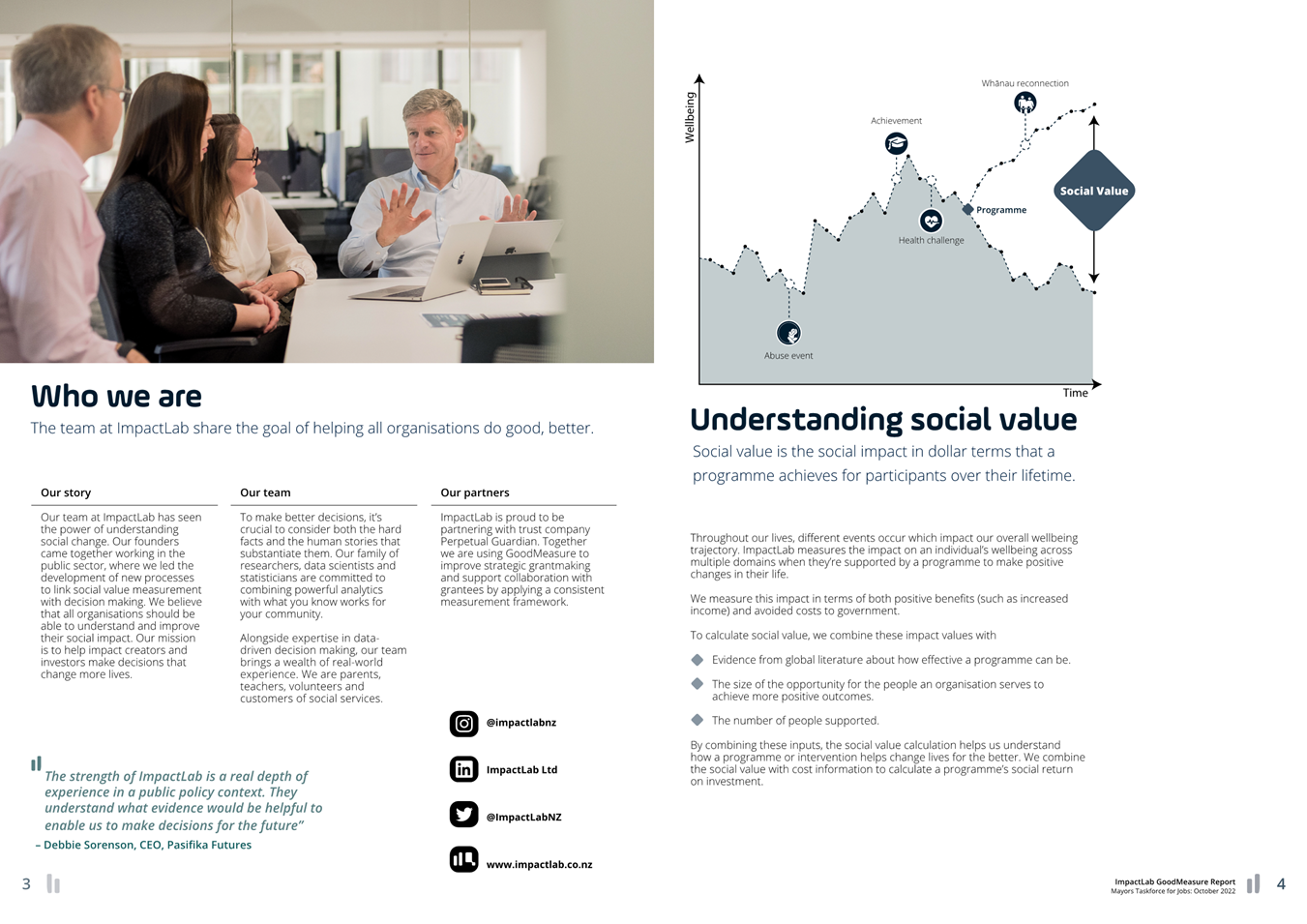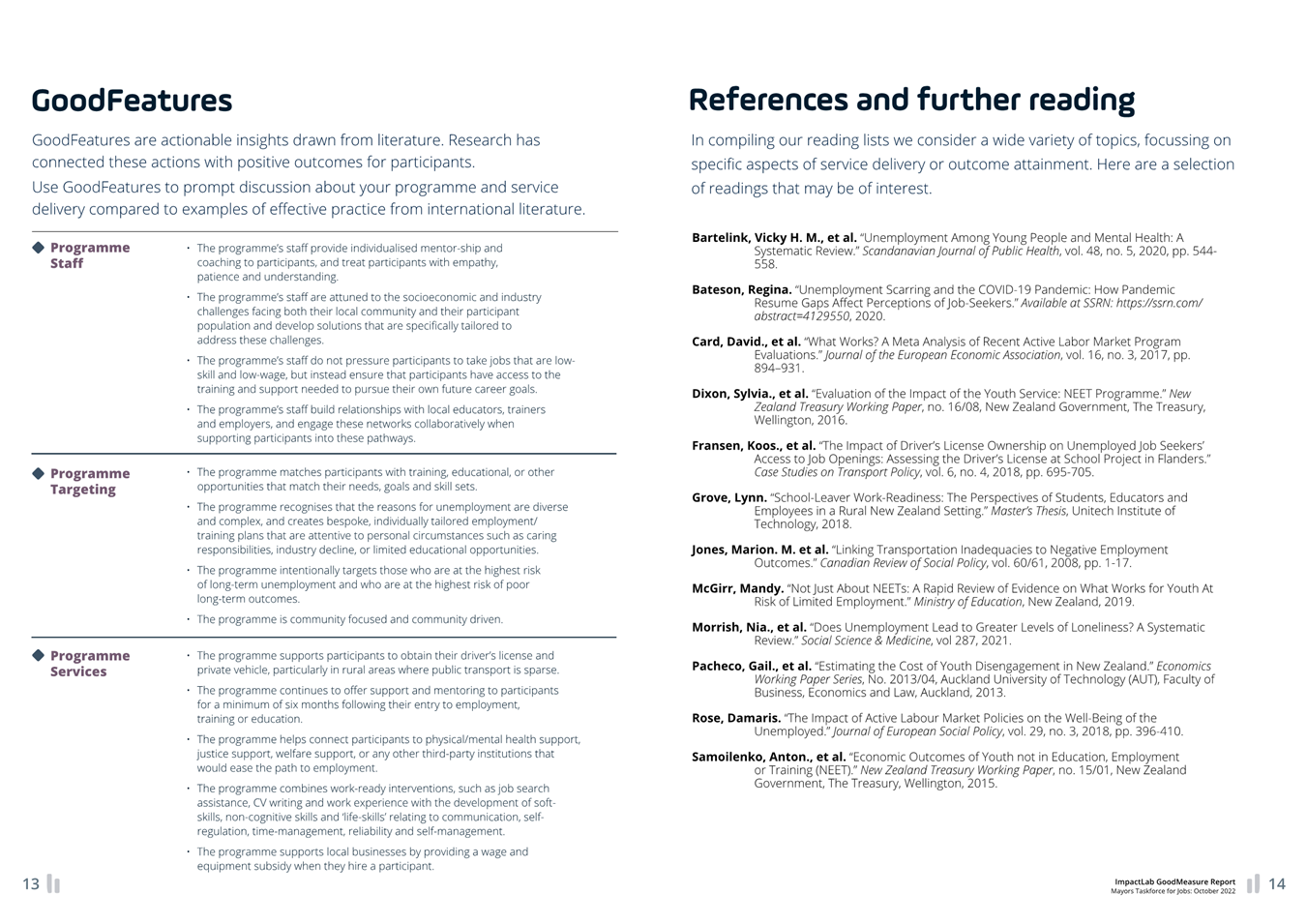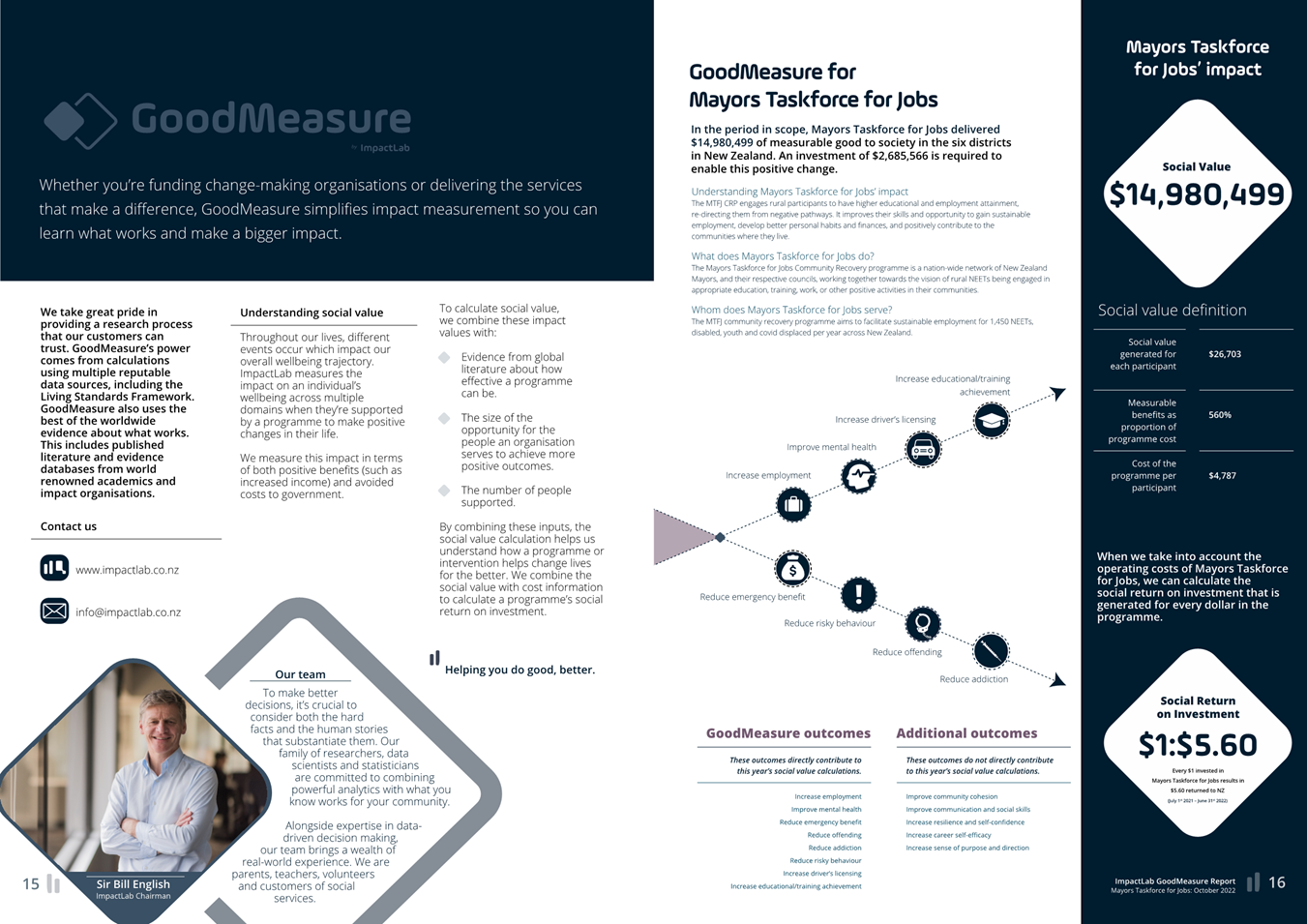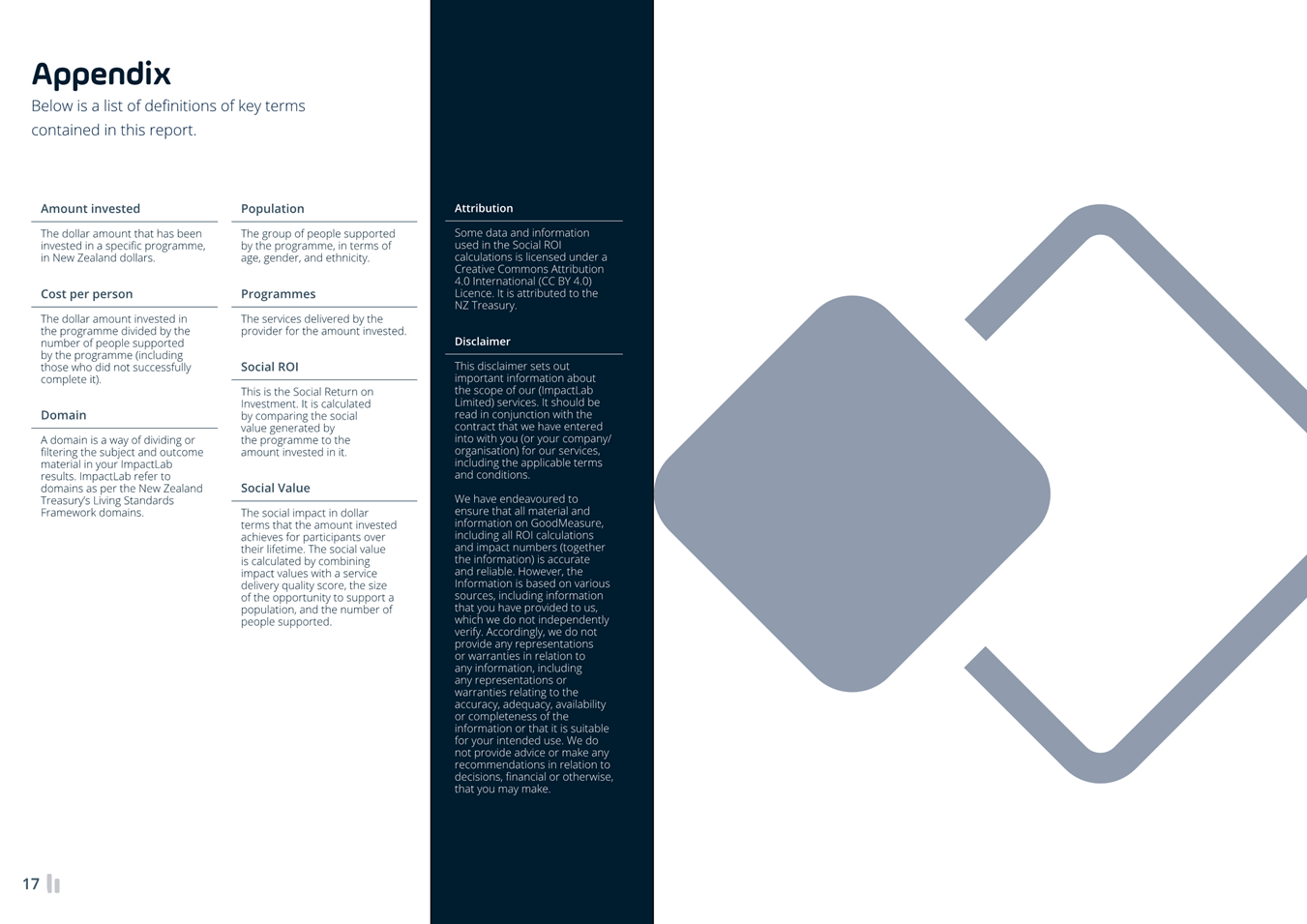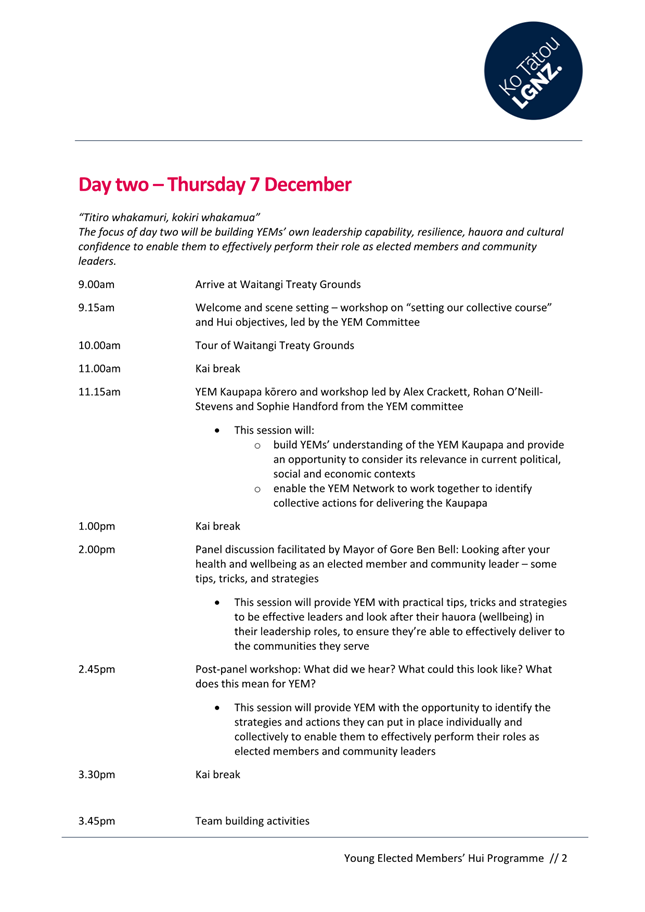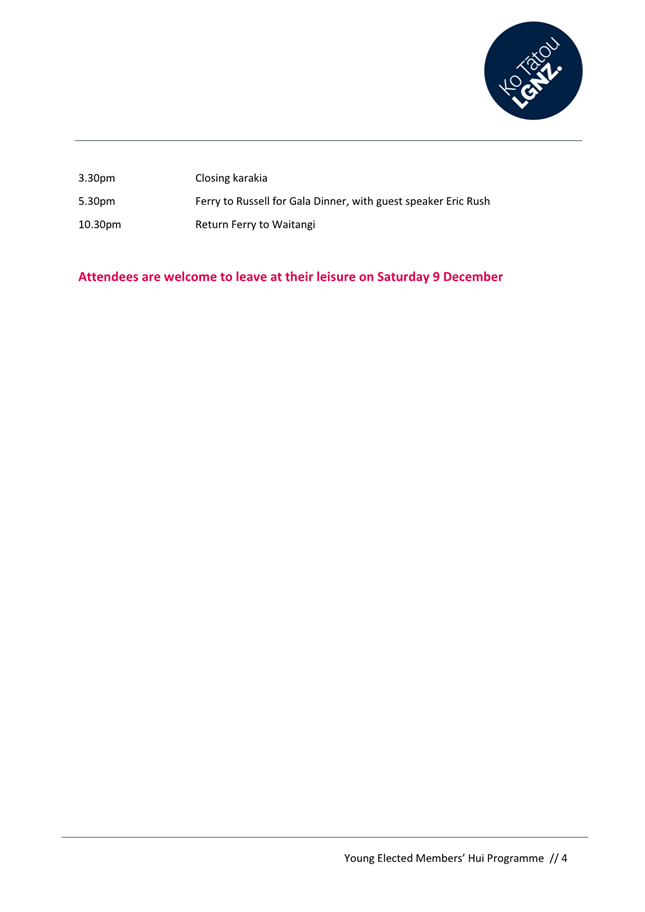
Te
Kaunihera o Te Hiku o te Ika
AGENDA
Ordinary Council Meeting
Thursday, 14 March 2024
|
Time:
|
10:00am
|
|
Location:
|
Council Chamber
Memorial Ave
Kaikohe
|
Membership:
Kahika - Mayor Moko Tepania -
Chairperson
Kōwhai - Deputy Mayor Kelly
Stratford
Cr Ann Court
Cr Felicity Foy
Cr Hilda Halkyard-Harawira
Cr Babe Kapa
Cr Penetaui Kleskovic
Cr Steve McNally
Cr Mate Radich
Cr Tāmati Rākena
Cr John Vujcich
1 Karakia
Timatanga / Opening Prayer
Ka tuku mātou kia kaha mai ngā māngai kua
whiriwhirihia mō Te Kaunihera o Te Hiku o te Ika ki te mahi me te
ngākau auaha me te whakamahi i ngā pūkenga me te mātauranga
i roto i ngā wānanga me ngā whakataunga kia whakatūria ai
tētahi Hapori e matatika ana, e tū kotahi ana ka mutu ka whakapiki
anō i te oranga o tō tātou rohe, ka whakatau anō i ngā
take o te rohe i runga i te tika me te pono.
We ask that through Council discussions and decisions the
representatives we have elected may govern the Far North District with
imagination, skill and wisdom to achieve a fairer and more united Community
that enhances the wellbeing of our district and solves the District’s
problems efficiently and effectively.
2 Ngā
Whakapāha Me Ngā Pānga Mema / Apologies and Declarations of
Interest
Members need to
stand aside from decision-making when a conflict arises between their role as a
Member of the Council and any private or other external interest they might
have. This note is provided as a reminder to Members to review the matters on
the agenda and assess and identify where they may have a pecuniary or other
conflict of interest, or where there may be a perception of a conflict of
interest.
If a Member feels
they do have a conflict of interest, they should publicly declare that at the
start of the meeting or of the relevant item of business and refrain from
participating in the discussion or voting on that item. If a Member thinks they
may have a conflict of interest, they can seek advice from the Chief Executive
Officer or the Manager - Democracy Services (preferably before the meeting).
It is noted that while members can seek advice the final
decision as to whether a conflict exists rests with the member.
An online register of Elected Member Interests can be found here.
3 Ngā
Tono Kōrero / Deputations
·
Gary Lees representing Mangonui Cemetary Committee regarding
upkeep and maintenance of the Mangonui Cemetary
·
Fiona King regarding Drainage Committee updates
·
Tracy Dalton regrarding the Twin Coast Cycle Trail
4 Ngā
Kōrero A Te Kahika / Mayoral Announcements
5 Te
Whakaaetanga o Ngā Meneti o Mua / Confirmation of Previous Minutes
5.1 Confirmation
of Previous Minutes
File
Number: A4578086
Author: Ellie
Greenwood, Democracy Advisor
Authoriser: Casey
Gannon, Manager - Democracy Services
Take Pūrongo / Purpose of the Report
The minutes are attached to allow Council to confirm that
the minutes are a true and correct record of previous meetings.
|
tŪtohunga
/ Recommendation
That Council confirm the minutes of the Ordinary
Council meeting held 08 February 2024 as a true and correct record.
|
1) TĀhuhu kŌrero / Background
Local Government Act 2002 Schedule 7 Section 28 states that
a local authority must keep minutes of its proceedings. The minutes of these
proceedings duly entered and authenticated as prescribed by a local authority
are prima facie evidence of those meetings.
2) matapaki me NgĀ KŌwhiringa
/ Discussion and Options
The minutes of the meetings are attached.
Far North District Council Standing Orders Section 27.3
states that no discussion shall arise on the substance of the minutes in any
succeeding meeting, except as to their correctness.
TAKE TŪTOHUNGA
/ REASON FOR THE RECOMMENDATION
The reason for the recommendation is to confirm the minutes
are a true and correct record of the previous meetings.
3) PĀnga PŪtea me ngĀ
wĀhanga tahua / Financial Implications and Budgetary Provision
There are no financial implications or the need for
budgetary provision as a result of this report.
Attachments
1. 2024-02-08
Council Minutes - A4561908 ⇩ 
Compliance schedule:
Full consideration has been given to the provisions of the
Local Government Act 2002 S77 in relation to decision making, in particular:
1. A
Local authority must, in the course of the decision-making process,
a) Seek
to identify all reasonably practicable options for the achievement of the
objective of a decision; and
b) Assess
the options in terms of their advantages and disadvantages; and
c) If
any of the options identified under paragraph (a) involves a significant
decision in relation to land or a body of water, take into account the
relationship of Māori and their culture and traditions with their
ancestral land, water sites, waahi tapu, valued flora and fauna and other
taonga.
2. This
section is subject to Section 79 - Compliance with procedures in relation to
decisions.
|
Compliance
requirement
|
Staff
assessment
|
|
State the level of significance
(high or low) of the issue or proposal as determined by the Council’s
Significance and Engagement Policy
|
This is a matter of low
significance.
|
|
State the relevant Council
policies (external or internal), legislation, and/or community outcomes (as
stated in the LTP) that relate to this decision.
|
This report complies with the
Local Government Act 2002 Schedule 7 Section 28.
|
|
State whether this issue or
proposal has a District wide relevance and, if not, the ways in which the
appropriate Community Board’s views have been sought.
|
It is the responsibility of each
meeting to confirm their minutes therefore the views of another meeting are
not relevant.
|
|
State the possible implications for Māori
and how Māori have been provided with an opportunity to contribute to
decision making if this decision is significant and relates to land and/or
any body of water.
|
There are no implications for Māori in confirming minutes
from a previous meeting. Any implications on Māori arising from matters
included in meeting minutes should be considered as part of the relevant
report.
|
|
Identify persons likely to be
affected by or have an interest in the matter, and how you have given
consideration to their views or preferences (for example,
youth, the aged and those with disabilities).
|
This report is asking for minutes
to be confirmed as true and correct record, any interests that affect other people
should be considered as part of the individual reports.
|
|
State the financial implications
and where budgetary provisions have been made to support this decision.
|
There are no financial
implications or the need for budgetary provision arising from this report.
|
|
Chief Financial Officer review.
|
The Chief Financial Officer has
not reviewed this report.
|
|
Ordinary
Council Meeting Agenda
|
14 March 2024
|










6 Ngā
Pūrongo / Reports
6.1 Options
Analysis for Financial Contributions
File
Number: A4528387
Author: Nadine
Hopkins, Senior Policy Advisor
Authoriser: Roger
Ackers, Group Manager - Planning & Policy
Take Pūrongo / Purpose of the Report
To seek approval to develop a chapter on financial
contributions in the District Plan.
WhakarĀpopoto matua / Executive Summary
· Collecting financial contributions is a way councils can
collect funding from developers. This does not replace a Development
Contributions Policy.
Update on Development Contributions
Policy work
· In December 2021 the governing body approved development of a
Development Contributions Policy as part of the 2021 Long-Term Plan process due
to a concern about lack of funding to pay for infrastructure
requirements.
· To develop a Development Contributions Policy, a strong evidence
base with reliable data is needed to determine what proportion of capital
expenditure projects incurred by council are related to (or caused by) growth,
as opposed to the part of the projects which just relate to maintaining service
levels.
· Identification of potential growth projects to date are primarily
for waters assets and possibly some roading assets/transport projects. Of
these, it is necessary to assess how much of these is growth-related. In
2023, the three waters legislation meant that those assets were to be
transferred out of Council’s control and Council could not charge
development contributions for them.
· The repeal of the three waters legislation in mid-February 2023 will
now allow Council to collect development contributions for three waters.
Work can now progress on a Development Contributions Policy for three waters
assets.
· Work is ongoing to support a Development Contributions Policy,
including asset management systems being created and spatial planning.
Financial Contributions as another method to consider – does
not replace a Development Contributions Policy.
· Collecting financial contributions is another way funding from
developers can be collected by Council. This does not require growth data
and the purposes for collecting financial contributions are broader than
development contributions. These are collected under the Resource
Management Act 1991.
· Collecting financial contributions does not mean a council cannot
also charge development contributions provided they do not double dip.
Approximately 61% of councils nationwide can collect a mixture of both.
· Currently, Council does not collect development contributions and
has very limited ability to collect financial contributions through the
operative District Plan.
· The Proposed District Plan does not include a chapter on financial
contributions. There is a potential opportunity for Council to include
this chapter through a plan variation to the Proposed District Plan, but
timeframes are very tight to do so.
· Financial contributions generally address the direct impacts of a
particular development. The purpose is to help pay for measures that will
avoid, remedy, or mitigate adverse effects on the environment, or
offset/compensate adverse effects in some other way.
· The definition of ‘environment’ is broad and includes
people and communities.
· Financial contributions can be used to address the increased demand
development can place on infrastructure.
· Financial contributions can be a contribution of money, land, or a
mixture of both.
· Approximately 95% of councils nationwide collect either development
contributions, financial contributions, or a mixture of both. Only 3
councils do not have the ability to collect anything.
· Collecting
financial contributions is a method which enables
Council to collect funding from developers. This does not replace a
Development Contributions Policy.
|
TŪTOHUNGA / RECOMMENDATION
That Council approve the development of a draft
financial contributions chapter which is to be incorporated into the District
Plan through a plan change after the Proposed District Plan becomes
operative.
|
1) TĀhuhu kŌrero / Background
Council has a significant role in developing, maintaining,
and operating local infrastructure such as roads, three waters infrastructure,
local parks and recreation facilities including community
facilities.
Development, subdivision, and use of land creates demand for
additional infrastructure such as for water supply, wastewater, and stormwater
disposal, roading, open spaces and community facilities, and can create other
adverse effects on the environment. For the Far North district these
costs are primarily met from rates revenue, which puts the development costs
onto the community. Some larger developments are subject to development
agreements where conditions are negotiated, and the developer meets some of the
costs or completes works to address them.
Concerns about lack of funding to pay for infrastructure
requirements and demands arising from development were identified in 2021 with
the governing body approving development of a Development Contributions Policy
in December that year. Council does not currently charge development
contributions.
What is needed to
charge development contributions
To require development contributions,
Council must identify the amount that Council is planning to spend on new
infrastructure to address growth needs. Best practice growth planning is via
spatial planning.
Reports obtained in mid-2023
identified the requirements Council needs to meet to progress a Development
Contributions Policy and growth planning. These concluded that:
Depending on the sort of asset involved, the
evidence to support a Development Contributions Policy generally includes (but
is not limited to) growth demand evidence, capital works plan identifying
growth-related projects, and information to enable the allocation of project
costs to growth, renewal and level or service upgrades (or meeting standards).
A gap analysis identified that it is
currently possible for Council to collate the necessary growth planning
information and evidence to support a Development Contributions Policy for
three waters and possibly some roading assets and projects. Of these, it is
necessary to assess how much is growth-related.
In 2023, the three waters reform legislation
meant Council was not able to require development contributions on three waters
assets. Instead, Water Infrastructure Contributions would have been set and
administered by Wai Tāmaki ki Te Hiku.
However, the three waters legislation was
repealed on 17 February 2024, with new laws to be passed about the delivery of
water services, including the use of a council-controlled organisation.
Subject to any other legislative changes, staff can now progress work on a
Development Contributions Policy for three waters assets and any other projects
which are growth-related. Staff will advise Council if any later
legislative changes affect Council’s ability to collect development
contributions.
Work is ongoing by different departments,
the outcomes of which would help support, and contribute to the development of,
a Development Contributions Policy, including:
· Asset management systems being created, which would provide evidence
about the assets, capacity and demand.
· Spatial planning, which provides growth demand evidence.
Financial contributions are an additional option
Another option to address funding concerns to pay for
infrastructure requirements and demands arising from development is through
collecting financial contributions under the Resource Management Act 1991 (RMA).
Financial contributions do not need to be linked to growth but must fit the
purpose of the RMA to achieve sustainable management. Exploring
alternative funding options supports the response referred to in the Long-Term
Plan 2021-2031 to continue to optimise the way Council funds infrastructure
needs. In order to collect financial contributions, the required
provisions must be included in a district plan.
The operative Far North District Plan only allows Council to
collect financial contributions for esplanade reserves and limited car parking
purposes. The Proposed District Plan (PDP) does not include a
chapter on financial contributions. By not having a chapter on financial
contributions, this will limit the ability for Council to obtain funding from
developers to address adverse effects or issues which arise from additional
demands on infrastructure that development creates. Councils only option
will be to impose conditions of consent, which is reflective of the current
status quo.
Limited window of opportunity to collect financial
contributions as part of the Proposed District Plan process
Council has a limited opportunity to include a financial
contributions chapter as a variation to the PDP. To fit in with the PDP process
and other minor variations to be notified for the PDP, Council needs to
publicly notify the financial contributions chapter by the end of July 2024.
Incorporating a chapter on financial contributions through this process is a
more efficient and cost-effective process than completing a plan change at a
later date. However, it may not be feasible to complete the work in this
timeframe.
If Council misses that timeframe any chapter on financial
contributions would need to either be a separate variation or wait until the
PDP becomes operative (late 2025/early 2026) and a new plan change
initiated. Both options would come with additional costs and further
delays. More detail on this is under Timelines below.
2) matapaki me NgĀ KŌwhiringa /
Discussion and Options
Staff have completed a research report describing the key
issues and opportunities from collecting financial contributions. Attached
is a copy of the report.
The report describes:
· issues which financial contributions may address, and
· how financial contributions can be calculated and collected.
The report makes
recommendations to ensure if Council does collect financial contributions the
approach taken:
· meets the purposes of the RMA,
· is transparent, consistent, and equitable, and
· considers effects on development, developers, the community and
Māori as well as the effects created by development and how climate change
may impact on this.
Impacts and
issues
Impacts and issues for the Far
North District from increased demands on infrastructure from development
include:
· Creating
strain on aging three waters infrastructure and assets which:
- are
prone to failure and breakage,
- cannot
meet existing demand,
- has
no, or very limited, capacity for future demand, and/or
- does
not comply with existing resource consents.
· Increased
use of local roads causing:
- traffic
congestion,
- more
requests for repairs and road sealing, and/or
- increased
costs associated with maintenance needs for roads.
· Lack
of sufficient open space or recreational facilities for the community.
Collecting
Financial Contributions
Financial contributions generally address the direct impacts
of a particular development for the purpose to help pay for measures that will
avoid, remedy, or mitigate adverse effects on the environment, or
offset/compensate adverse effects in some other way. The definition of
‘environment’ is broad and includes people and communities.
Financial contributions can be a contribution of money,
land, or a mixture of both.
Approximately 95% of councils nationwide collect either
development contributions, financial contributions, or a mixture of both.
Only 3 councils do not have the ability to collect anything.
For Council to collect financial contributions, the District
Plan must include a chapter covering the rules which apply. There is an
opportunity for Council to include this chapter as part of the PDP process by
completing a plan variation.
Council can still enter into development agreements if there
is also the ability to charge financial contributions. The rules about
financial contributions can be prepared to operate in such a way to complement
or provide alternatives for Council and developers to negotiate a development
agreement. Financial contributions would also provide a default or back
stop position if agreements with developers cannot be reached.
The amount Council could collect
depends on the methods used. Different methods include:
· Fixed
amounts per new lot or separately rated unit, adjusted annually. This
could be based on the value of existing assets.
· Cost
recovery models which depend on the cost involved in upgrading relevant
infrastructure to meet the demands from the development.
· Taking
an amount based on the value of the new lot or unit created (for example 4%).
Potential
Impacts on Māori and whenua Māori
The inclusion of financial contributions and financial
contributions policy must support the principles to Te Ture Whenua Māori
Act 1993 which includes facilitating the development and utilisation of whenua
Māori land for the benefit of the owners, whānau, and hapū.
As part of identifying potential
impacts and issues, staff have reviewed 16 iwi and hapū management plans
for iwi and hapū in the Far North and undertaken research on this
issue. Impacts identified include:
· Development
of whenua Māori may be constrained by both lack of proper infrastructure
and cost. Charging financial contributions could increase those costs.
· Concerns
that the ratepayers and future generations are bearing the financial burden for
developments as developers have not paid for the full and real cost of
providing infrastructure and services to new development.
· If
contributions are to be paid, there should be a range of tools to exempt or
waive payment, or reduce the amount, which may apply to iwi economic
development.
Other councils allow for a
discount or waiver to pay development or financial contributions for
developments on whenua Māori, such as:
· Western
Bay of Plenty District Council allows for a deduction for papakāinga with
a charge based on one household equivalent for the first dwelling on the site,
and then a 100% deduction for additional dwellings up to a maximum of 10
dwellings.
· Auckland
Council does not charge contributions for reserves for not-for-profit
developments on whenua Māori due to much of Auckland’s parkland
previously being Māori land.
· Christchurch
City Council has a development contributions rebate scheme where certain
developments on whenua Māori do not pay contributions.
OPTIONS
Options are as
follows:
Option One: Develop Financial
Contributions to be in a Far North District Plan (Recommended Option)
Staff undertake the work needed to develop
a chapter on financial contributions to be included in the district plan
(including through any variation to the PDP).
|
BENEFITS
|
RISKS
|
|
Environmental:
Provides ability to address potential
impacts on the environment and infrastructure created from development.
Economic:
Shifts financial burden of costs to
Council to fund infrastructure needs arising from development or adverse
environmental effects from ratepayers to the developer.
May encourage more and provide more
certainty for development agreements.
May open more areas for development if
there are funds to pay for necessary upgrades or renewals of infrastructure.
Social:
Better infrastructure including more open
spaces improves wellbeing for communities.
Cultural:
May support or enable development on
whenua Māori by funding infrastructure needs.
|
Environmental:
N/A
Economic:
May be a barrier to development occurring
and increase costs of housing.
Where financial contributions are
collected and need to be spent on new infrastructure, there may be additional
ongoing maintenance costs incurred by Council for the life of that new
infrastructure.
Social:
May be low public appetite/reputational
risk from putting additional costs onto development with developers used to
not having to pay them.
Cultural:
May put additional costs onto development
occurring on whenua Māori.
|
Implementation of Option One can
occur either as part of the PDP process, or after the PDP becomes operative
Timelines to implement Option One
are:
· Option
1A, which is to develop financial contributions to fit in with the PDP process
as a plan variation, or
· Option
1B, which is to develop financial contributions as a plan change to occur after
the PDP is operative.
A summary of these timeline options
is below.
Option Two: Status quo/Do
nothing: Do not develop financial contributions to be included in the Far North
District Plan
Staff do not undertake the work to
develop a chapter on financial contributions to be included in the district
plan (including through any variation to the PDP).
|
BENEFITS
|
RISKS
|
|
Environmental:
N/A
Economic:
Allows development to continue without
additional costs from local government.
Social:
No change means less political risk from
public about concerns of Council imposing more costs on development.
Cultural:
Would not impose more costs on
development of whenua Māori.
|
Environmental:
Adverse effects on the environment from
development and additional demand on infrastructure continues.
Economic:
Costs associated with adverse effects and
demand from development met by ratepayers.
Social:
Infrastructure will only be upgraded or
renewed in accordance with funding available from rates or central
government. Loss of opportunity to enhance wellbeing to communities.
With Council being one of the few in the
country that does not collect funding from developers through contributions,
reputational risk that the Council is not exploring other methods of funding
for needs of the community.
Cultural:
Infrastructure needs for whenua
Māori would continue as is. Loss of opportunity.
|
OPTIONS FOR TIMELINES
If Council wishes to develop a
chapter on financial contributions, the timelines to this would be:
· a
best case for it to meet the PDP, or
· if
the PDP timelines are not met, there is still the ability for a plan change to
occur later.
Option 1A: Plan variation to include financial
contributions as part of the PDP process
If Council were to include financial contributions as a
chapter in the PDP through a plan variation at the same time as other minor
variations are to be notified for the PDP, the estimated timeline is below:

Benefits and opportunities of developing the chapter on
financial contributions to fit in with the PDP timelines are:
· Fits
in with current costs and resourcing for the PDP, with costs associated with
the PDP including hearings already allocated as part of operational budget.
· More
efficient process by combining this with other variations required for the PDP.
· Does
not delay or change PDP timelines.
· May
be more time/cost effective for the public to engage with it through one
process, rather than multiple.
· Would
become operative sooner – estimated adoption early 2026.
The issues and risks of doing so are:
· The
variation process will need to be shortened with less engagement, including
less engagement with iwi, in a tight timeframe undertaken prior to public
notification of a draft.
· Less
or minimal upfront engagement can be a reputational risk to the Council with no
ability to build up public awareness.
· Tight
timeframe to turn around work required means any slippage in time may lead to
not meeting the PDP timelines or a delay the PDP. With the limited time, any
changes or issues which arise as part of development of the chapter will mean a
significant risk the timeline will not be met.
Council does have the other option of doing a separate
variation, with a notification date of up to October if the required work could
not be completed in time for a July notification. This would likely delay
Council decisions for up to 2 months, require an extension of time from the
Ministry of Environment, additional costs and place pressure on staff and the
public with PDP hearings occurring at the same time.
Option 1B: Plan change after
the PDP is operative (Recommended Option)
Alternatively, Council could include a chapter on financial
contributions in the District Plan after the PDP becomes operative via a plan
change.
Benefits and opportunities of developing the chapter on
financial contributions to be a separate plan change (to occur after the PDP
becomes operative) are:
· The
focus would be solely on financial contributions and not the full PDP.
· Provides
an opportunity to fully engage and consult with iwi partners and community
stakeholder groups and build up public awareness.
· Time
can be taken with drafting and subject any draft to more scrutiny.
The issues and risks of doing so are:
· It
will be more costly and less efficient as a stand-alone plan change.
· A
plan change will become operative later – estimated adoption late 2027
(assuming there will be appeals)
· Loss
of efficiency for the public, with the public having to engage again for a
later plan change.
If
Council agrees with the recommendation, elected members will be updated
on the progress of the development of a chapter on financial contributions at
future PDP and financial contributions workshops in March. Council
approval is required to notify the variation and timeframes and process can be
discussed with Council during the development of the variation.
TAKE
TŪTOHUNGA / REASON FOR THE RECOMMENDATION
There
are two recommendations:
· to develop financial contributions to be in a Far North
District Plan; and
· for the chapter and provisions to be including the District
Plan via a plan change after the PDP is operative.
Council
having the ability to collect financial contributions provides an
additional form of revenue for funding. It moves the financial burden for
additional demand placed on infrastructure and assets and adverse effects on
the environment from development from being funded by rates, to being funded by
the developers.
Including the chapter and
provisions on financial contributions through a plan change after the PDP
becomes operative:
· removes
the risks associated with the tight PDP timelines, and
· allows
the time for more consultation and engagement on any draft prepared and for it
to be familiarised with the public prior to notification.
Next steps
If Council agrees with the
recommendation, the proposed chapter and provisions on financial contributions
would be drafted along with the required evaluation under s32 of the
RMA. Consultation on the draft would be completed as per Schedule 1
of the RMA. A report back to Council will be required prior to the draft
provisions being finalised for public notification.
3) PĀnga PŪtea me ngĀ
wĀhanga tahua / Financial Implications and Budgetary Provision
Developing a financial
contributions chapter and associated requirements, including the evaluation
required under s32 of the RMA is expected to cost approximately
$60,000.00. Costs for this would be met out of existing budgets for this
financial year.
If financial contributions are to
be included as a variation to the PDP, the costs associated with notification
and the hearings would be part of the decision Council is to make about public
notification of the draft chapter and falls into the next financial year.
If the approach is to include a
chapter on financial contributions through a plan change after the PDP becomes
operative, there will be additional costs including costs of hearing
commissioners. Based on other plan changes, these costs may exceed
$100,000 depending on the level of complexity and hearings requirements. As a
plan change would occur much later (approx. 2027) these costs are subject to
change).
Āpitihanga
/ Attachments
1. Research
Report Financial Contributions - January 2024 - A4539282 ⇩ 
Hōtaka Take Ōkawa / Compliance Schedule:
Full consideration has been given to the provisions of the
Local Government Act 2002 S77 in relation to decision making, in particular:
1. A
Local authority must, in the course of the decision-making process,
a) Seek
to identify all reasonably practicable options for the achievement of the
objective of a decision; and
b) Assess
the options in terms of their advantages and disadvantages; and
c) If
any of the options identified under paragraph (a) involves a significant
decision in relation to land or a body of water, take into account the
relationship of Māori and their culture and traditions with their
ancestral land, water sites, waahi tapu, valued flora and fauna and other
taonga.
2. This
section is subject to Section 79 - Compliance with procedures in relation to
decisions.
|
He Take Ōkawa /
Compliance Requirement
|
Aromatawai Kaimahi /
Staff Assessment
|
|
State the level of significance (high or low) of the
issue or proposal as determined by the Council’s
Significance and Engagement Policy
|
In line with the Significance
and Engagement Policy the recommendation to start developing a chapter on
financial contributions will have little effect on financial thresholds,
ratepayers, specific demographics, or levels of service. Therefore, at this
stage in the development process the level of significance is low.
As part of the next stage in
notifying the proposal, it is expected the significance will be higher and
additional consultation is required by Schedule 1 of the RMA.
|
|
State the relevant Council policies (external or
internal), legislation, and/or community outcomes (as stated in the LTP) that
relate to this decision.
|
Long-Term Plan 2021-2023: supports the strategic
response to asset management to continue to optimise the way infrastructure
is funded.
Revenue and Financing Policy 2021: the approach
to funding capital expenditure to replace, upgrade or build assets to be
funded from rates and borrowing will need to be updated to reflect any
changes to funding options.
Climate Change Policy 2023: policy for Council to
remain alert to funding opportunities to reflect the significant financial
implications of climate change adaptation and mitigation.
|
|
State whether this issue or proposal has a District wide
relevance and, if not, the ways in which the appropriate Community
Board’s views have been sought.
|
Charging financial
contributions is a District wide issue and so the views of Community Boards
have not been sought for the decision in this report. However, the drafting
of the chapter may identify a need for local or ward variation, and
engagement and/or views of Community Boards sought as part of the
development.
|
|
State the
possible implications for Māori and how Māori have been provided
with an opportunity to contribute to decision making if this decision is
significant and relates to land and/or any body of water.
State the
possible implications and how this report aligns with Te Tiriti o Waitangi /
The Treaty of Waitangi.
|
Māori are
landowners in the district including of whenua Māori and treaty
settlement land. Any development which occurs on these may be affected
if financial contributions are charged.
Land owned by
Māori is often complex with multi ownership structures and payment of
additional costs may create a further barrier to implementing papakāinga
or other development. However, having funds to put in infrastructure
which would benefit whenua Māori or treaty settlement land would further
enable development to occur on those lands, and shifts the financial burden
away from the existing community. This should be an issue explored
through further engagement. Further
consultation with iwi through the Resource Management Act Schedule 1 process
would occur as part of next steps.
|
|
Identify persons likely to be affected by or have an
interest in the matter, and how you have given consideration to their views
or preferences (for example – youth, the aged and those with
disabilities).
|
Some limited consultation and
engagement has occurred to identify potential issues and opportunities.
Further engagement will be required as part of drafting the chapter.
Public notification is also required of the draft chapter.
|
|
State the financial implications and where budgetary
provisions have been made to support this decision.
|
Developing a financial
contributions chapter and associated requirements, including the evaluation
required under s32 of the RMA is expected to cost approximately
$60,000.00. Costs for this would be met out of existing budgets for
this financial year.
If financial contributions are
to be included as a variation to the PDP, the costs associated with
notification and the hearings would be part of the decision Council is to
make about public notification of the draft chapter and falls into the next
financial year.
If the approach is to include
a chapter on financial contributions through a plan change after the PDP
becomes operative, there will be additional costs including costs of hearing
commissioners. Based on other plan changes, these costs may
exceed $100,000 depending on the level of complexity and hearings
requirements. As a plan change would occur much later (approx. 2027) these
costs are subject to change).
|
|
Chief Financial Officer review.
|
The CFO has reviewed this report.
|
|
Ordinary
Council Meeting Agenda
|
14 March 2024
|
































6.2 Alcohol
Control Bylaw Continuation
File
Number: A4571868
Author: Donald
Sheppard, Policy Advisor
Authoriser: Jonathan
Slavich, Chief Financial Officer
Take Pūrongo / Purpose of the Report
The purpose of this report is to recommend to Council to
agree the Alcohol Control Bylaw should continue without amendment.
WhakarĀpopoto matua / Executive Summary
· The Alcohol Control Bylaw (the Bylaw) was due for review by 13
December 2023
· This review took place on 16 November 2023 when Council agreed:
o the Bylaw is the most appropriate way to address identified problems
of crime, disorder and incidents of harm relating to the consumption, bringing
in, and/or possession of alcohol in public places in the Far North District
o the Bylaw is in the most appropriate form
o any implications on peoples’ rights associated with the Bylaw
are justified in accordance with the New Zealand Bill of Rights Act 1990
o the Bylaw should continue without amendment subject to public
consultation following the principles in section 82 of the Local Government Act
2002.
· Based on the consultation feedback, Council staff recommend no
changes to the Bylaw meaning it can continue without amendment.
|
tŪtohunga
/ Recommendation
That Council
a) agree
to continue the Alcohol Control Bylaw without amendment under section 147 of
the Local Government Act 2002
b) agree
the Chief Executive may make minor changes to the Bylaw to correct
grammatical or spelling errors, update the review dates, or make formatting
changes.
|
1) TĀhuhu kŌrero / Background
The Bylaw is included as Attachment One.
On 16 November 2023, under section 160(3)(b)(ii) of the
Local Government Act 2002, Council agreed to consult on continuing the Bylaw
without amendment in a manner that gives effect to the requirements of section
82 of the Local Government Act 2002 (Resolution 2023/147 refers). Note that the
schedules to the Bylaw, including the list of Alcohol Control Areas, may be
amended by resolution at any time in the future.
In the period from 20 November to 18 December 2023, the
public was invited to provide their written views on continuing the Bylaw or
not. In addition, oral submissions were heard by the Council on 08
February 2024.
Eighty written submissions were received (69 online and 11
via email), while 2 people also made oral submissions.
Seventy submissions (88%) fully supported continuing the
Bylaw without amendment, 3 submissions (4%) supported this in part, while 7
submissions (9%) did not support the Bylaw continuing without amendment at all.
Main reasons for supporting the Bylaw continuing without
amendment are:
· Happy with the
current Bylaw (15 mentions)
· Bylaw supports
public safety (12 mentions)
· Bylaw reduces
alcohol-related harm/abuse (9 mentions)
· Bylaw supports law
and order/prevents crime (9 mentions)
· Bylaw is positive
for community wellbeing (8 mentions)
· Bylaw gives the
Police the power to act (or use discretion) (5 mentions)
A relatively small number of submitters gave reasons for not
continuing the Bylaw and/or amending the Bylaw. Main reasons mentioned are:
· Being concerned
about enforcement of the Bylaw (5 mentions)
· The Alcohol
Control Areas need updating (3 mentions)
· Bylaw should
restrict the number of outlets selling alcohol and their hours of operation (3
mentions)
· Bylaw should
address underage drinking (2 mentions)
· Council does not
have the authority to make the Bylaw (2 mentions)
Council staff recommend that none of these submissions
require changes to the Bylaw or require the Bylaw not to continue.
Attachment Two is a report which analyses these submissions
in detail and recommends the Bylaw should continue without amendment.
2) matapaki me NgĀ KŌwhiringa /
Discussion and Options
On 16 November 2023 Council agreed to the option to continue
the Bylaw without amendment (Resolution 2023/147 refers). Advantages of this
option include:
· the Bylaw
addresses serious problems relating to crime, disorder and incidents of harm
associated with alcohol in public places
· it supports the
community outcome of ‘Communities that are healthy, safe, connected and
sustainable’
· it targets areas
where high levels of alcohol-related crime and disorder have occurred
· it provides the
Police with enforcement powers:
o to prevent alcohol-related
problems escalating
o that are quick and instant to
apply
o that are discretionary
o that are less time consuming
and easier to apply than charging offenders under the Summary Offences Act
1981.
· continuing the
Bylaw is strongly supported by the Police and Te Whatu Ora (Ngā Tai Ora
– Public Health Northland)
· the Bylaw will not
need to be reviewed again until December 2033.
For these reasons Council staff recommended the Bylaw should
continue without amendment.
TAKE TŪTOHUNGA
/ REASON FOR THE RECOMMENDATION
Feedback from public consultation strongly supports
continuing the Bylaw without amendment with 70 out of 80 submitters (88%)
wholly supportive.
Suggested amendments to the Bylaw by submitters such as
regulating the number of licensed premises and their opening hours or updating
the Alcohol Control Areas authorised by the Bylaw, while valuable suggestions,
are out of scope for the consultation exercise.
Reasons given by submitters for not continuing the Bylaw,
such as Council not having the authority to make the Bylaw, are not valid.
3) PĀnga PŪtea me ngĀ
wĀhanga tahua / Financial Implications and Budgetary Provision
The current ongoing costs to administer the alcohol control
areas authorised by the Bylaw come from the Environmental Health Services
operational budget in the Annual Plan and include:
· Periodically
printing new self-adhesive signs costing around $4,000 per print run, which
will last several years
· Annual inspections
of the alcohol control areas to identify and replace vandalised or weathered
signage (involves staff time only).
There will be no new costs involved if the Bylaw continues
without amendment.
Āpitihanga
/ Attachments
1. Alcohol-control-bylaw-2018
- A4572555 ⇩ 
2. Analysis
of Alcohol Control Bylaw Submissions - A4572415 ⇩ 
Hōtaka Take Ōkawa / Compliance Schedule:
Full consideration has been given to the provisions of the
Local Government Act 2002 S77 in relation to decision making, in particular:
1. A
Local authority must, in the course of the decision-making process,
a) Seek
to identify all reasonably practicable options for the achievement of the
objective of a decision; and
b) Assess
the options in terms of their advantages and disadvantages; and
c) If
any of the options identified under paragraph (a) involves a significant
decision in relation to land or a body of water, take into account the
relationship of Māori and their culture and traditions with their
ancestral land, water sites, waahi tapu, valued flora and fauna and other
taonga.
2. This
section is subject to Section 79 - Compliance with procedures in relation to
decisions.
|
He Take Ōkawa /
Compliance Requirement
|
Aromatawai Kaimahi /
Staff Assessment
|
|
State the level of significance (high or low) of the
issue or proposal as determined by the Council’s
Significance and Engagement Policy
|
While the Bylaw covers the serious problem of
alcohol-related crime, disorder and incidents of harm in public places in the
district, under Council’s Significance and Engagement Policy it is not
an area of high significance, as it:
o does
not involve the transfer of ownership or control of a strategic asset or
other important asset
o is
not inconsistent with current Council policies.
|
|
State the relevant Council policies (external or
internal), legislation, and/or community outcomes (as stated in the LTP) that
relate to this decision.
|
The relevant community outcome from the Long-Term Plan
is ‘communities that are healthy, safe, connected and
sustainable’.
Requirements to review the Bylaw are covered by section
155 of the Local Government Act 2002.
Section 147 of the Local Government Act 2002 authorises
the Council to make a bylaw for alcohol control purposes, while sections 169
and 170 of this Act describe the powers for the Police to enforce the
Bylaw.
|
|
State whether this issue or proposal has a District wide
relevance and, if not, the ways in which the appropriate Community
Board’s views have been sought.
|
As a district-wide matter, it is outside the delegations
of Community Boards to provide their views on the continuation of the Bylaw.
However, when the alcohol control areas are reviewed (as a separate
exercise), the views of the Community Boards will be essential.
|
|
State the
possible implications for Māori and how Māori have been provided
with an opportunity to contribute to decision making if this decision is
significant and relates to land and/or any body of water.
State the
possible implications and how this report aligns with Te Tiriti o Waitangi /
The Treaty of Waitangi.
|
The
Bylaw does not consider the relationship of Māori to land, water, sites,
wāhi tapu, valued flora and fauna and other taonga as it does not
“significantly affect land or a body of water” as covered by
section 60A of the Local Government Act 2002.
However, as crime, disorder, and incidents of
alcohol-related harm in public places may disproportionately affect
Māori, the views of Māori are essential. The views of iwi and
hapū will be integral when the alcohol control areas are reviewed.
|
|
Identify persons likely to be affected by or have an
interest in the matter, and how you have given consideration to their views
or preferences (for example – youth, the aged and those with
disabilities).
|
There are two main groups of persons likely to be
affected by the Bylaw and its provisions:
1) The general public – the public can be
negatively affected by crime and disorder in public places e.g. feeling
intimidated or threatened by intoxicated individuals, having their property
damaged, and/or not enjoying being in these public places
2) Those consuming alcohol in public – the Bylaw
puts in place controls on the consumption of alcohol in designated Alcohol
Control Areas. If someone is peacefully enjoying a drink in these areas, the
Police have the discretion to ignore these people. However, the Police have a
range of powers in the Bylaw to address offenders whose behaviour is
intimidating, aggressive or anti-social.
|
|
State the financial implications and where budgetary
provisions have been made to support this decision.
|
There will be no new costs involved if the Bylaw continues
without amendment.
|
|
Chief Financial Officer review.
|
The CFO has reviewed this report.
|
|
Ordinary
Council Meeting Agenda
|
14 March 2024
|








|
Ordinary Council
Meeting Agenda
|
14 March 2024
|





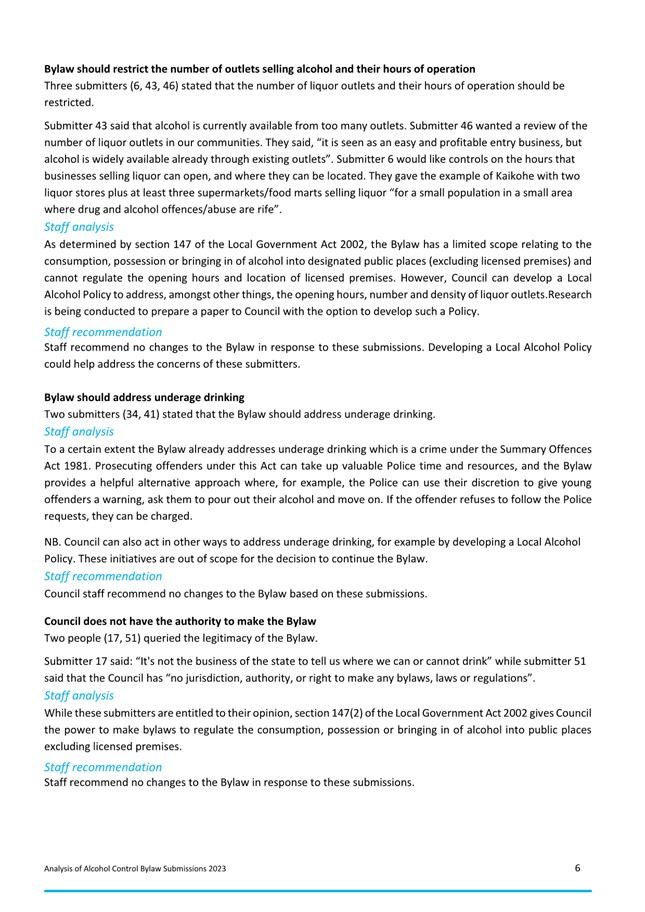



6.3 Statement
of Proposal- Transfer of the Independent Qualified Person's (IQP's) Register to
Aukland Council
File
Number: A4578261
Author: Trent
Blakeman, Manager - Building Services
Authoriser: Kevin
Johnson, Group Manager - Delivery and Operations
Take Pūrongo / Purpose of the Report
To approve and adopt for consultation the transfer of the
administration of the Independent Qualified
Person’s (IQP’s) Register (including the acceptance of Independent
Qualified Person’s) to Auckland Council.
WhakarĀpopoto matua / Executive Summary
There are two options under consideration, either build and maintain
an IQP register ourselves or transfer the powers to Auckland Council.
There are a range of factors in favour of the transfer of powers
including a more technological advanced system for Independent Qualified
Person’s and building owners through the Auckland Council website,
additional opportunities for working outside Northland, a reduction in
compliance costs and a potential reduction in risk from an improved assessment
regime.
Should the transfer not occur it is likely that our current
processes will require review and likely amendment which will create additional
costs.
|
tŪtohunga
/ Recommendation
That
Council:
a) adopt
the statement of proposal which is subject to s.83 the Special Consultative
Procedure Process under the Local Government Act 2002.
b) resolve
to seek public submissions on the proposal between 2 April 2024, and 30 April
2024, in accordance with the Special Consultative Procedure process.
c) authorise
the Chief Executive to make any necessary drafting, typographical or
presentation corrections to the attached supporting documents prior to
consultation.
|
1) TĀhuhu kŌrero / Background
At
present Whangarei District Council maintain the register of Independent
Qualified Person’s for all 3 of Northland’s District Councils. This
arrangement has been in place for approximately 20 years and means that
Independent Qualified Persons who are on the register can undertake work
throughout Northland rather having to be accepted by 3 different Councils.
It is
proposed to transfer those responsibilities including the setting of fees to
Auckland Council.
Whangarei
& Kaipara District Councils have transferred the powers.
The
proposed transfer only relates to the approval of Independent Qualified
Person’s, the maintenance of the register of Independent Qualified
Person’s and the setting of fees for such approval and on-going
registration.
2) matapaki me NgĀ KŌwhiringa /
Discussion and Options
Councils
throughout the country are working together in relation to the registering of
IQPs. For example, the South Island operates under one register administered by
Timaru District Council and there is a joint group that administers the
register for Hamilton City Council, Hauraki District
Council, Matamata Piako District Council, Otorohanga District Council,
Thames Coromandel District Council, Waikato District Council, Waipa District
Council & Waitomo District Council.
There
are 2 main reasons why the transfer of power is being considered, being
efficiencies and technical capability. These considerations are outlined in the
procedures for transfer under the Local Government Act 2002. The
technical capability is important as robust assessment of Independent Qualified
Person’s will result in reduced risk going forward. The consideration of
these matters is outlined in the attached statement of proposal (SOP).
Risks
The
administration of the BWoF (Building Warrant of Fitness) system carries risks
for Councils generally. It is considered that Auckland Council has a robust
established process for considering the acceptance of IQPs (Independent
Qualified Person) to undertake their responsibilities under the Building Act
2004. This is considered an important component in ensuring the on-going safety
of the public.
Options
1.) That FNDC transfer the Duty of assessing and
keeping an IQP register to Aukland Council, -this option provides the
highest level of assessment of an Independent Qualified Person’s
with no cost to FNDC.
2.) That FNDC take back the duty of assessing and
keeping an Independent Qualified Person’s register, therefore build, and
maintain their own IQP register. -this is considered the least resilient
option due to cost, competence, and retention of qualified staff.
3.) That the four councils enter in a join
committee to maintain and assess Independent Qualified Person’s. -
this option was not furthered due to complexity.
TAKE TŪTOHUNGA
/ REASON FOR THE RECOMMENDATION
It provides for the least cost to FNDC and the best overall
outcome for Independent Qualified Person’s and building owners in
northland in terms of cost and the standard of competence of Independent
Qualified Person’s.
3) PĀnga PŪtea me ngĀ
wĀhanga tahua / Financial Implications and Budgetary Provision
Financial considerations are outlined in the SOP. There will only be
financial and budgetary implications if FNDC do not transfer the powers to
Auckland, that being the cost of building and managing an Independent Qualified
Person’s register.
Āpitihanga
/ Attachments
1. Statement
of Proposal: Transfer of Powers under the Building Act 2004 - A4605534 ⇩ 
Hōtaka Take Ōkawa / Compliance Schedule:
Full consideration has been given to the provisions of the
Local Government Act 2002 S77 in relation to decision making:
1. A
Local authority must, in the course of the decision-making process,
a) Seek
to identify all reasonably practicable options for the achievement of the
objective of a decision; and
b) Assess
the options in terms of their advantages and disadvantages; and
c) If
any of the options identified under paragraph (a) involves a significant
decision in relation to land or a body of water, take into account the
relationship of Māori and their culture and traditions with their
ancestral land, water sites, waahi tapu, valued flora and fauna and other
taonga.
2. This
section is subject to Section 79 - Compliance with procedures in relation to
decisions.
|
He Take Ōkawa /
Compliance Requirement
|
Aromatawai Kaimahi /
Staff Assessment
|
|
State the level of significance (high or low) of the
issue or proposal as determined by the Council’s
Significance and Engagement Policy
|
Medium: The decisions or matters of
this Agenda require the use of the special consultative procedure as set out
in section 83 of the Local Government Act 2002. This is a requirement for any
transfers of power under the Building Act 2004. It is proposed to consult
directly with existing IQPs and the public generally.
|
|
State the relevant Council policies (external or
internal), legislation, and/or community outcomes (as stated in the LTP) that
relate to this decision.
|
As FNDC has not managed an Independent Qualified
Person’s register in some 20 years, there is no relevant council
policies that relate to the LTP that I am aware of.
|
|
State whether this issue or proposal has a District wide
relevance and, if not, the ways in which the appropriate Community
Board’s views have been sought.
|
This is a district wide as it relates to all buildings
that have specified systems and those that are open to the public.
|
|
State the
possible implications for Māori and how Māori have been provided
with an opportunity to contribute to decision making if this decision is
significant and relates to land and/or any body of water.
State the
possible implications and how this report aligns with Te Tiriti o Waitangi /
The Treaty of Waitangi.
|
There are no Treaty of Waitangi implications relating to
the transfer of the Independent Qualified Person’s register to Auckland
District Council. All IQP’s and building owners that have Building
Warrant of Fitness’s will be impacted.
|
|
Identify persons likely to be affected by or have an
interest in the matter, and how you have considered their views or
preferences (for example – youth, the aged and those with
disabilities).
|
IQP’s and building owners that have Building
Warrant of Fitness’s.
|
|
State the financial implications and where budgetary
provisions have been made to support this decision.
|
Please refer to attached Statement of Proposal
|
|
Chief Financial Officer review.
|
The CFO has reviewed this report.
|
|
Ordinary Council Meeting Agenda
|
14 March 2024
|






6.4 Ground
Lease to Doubtless Bay Sea Scouts - East Street Taipa
File
Number: A4581251
Author: Michelle
Rockell, Team Leader - Property Management
Authoriser: Kevin
Johnson, Group Manager - Delivery and Operations
Take Pūrongo / Purpose of the Report
To seek resolution from Council on the granting of a new ground
lease over recreation reserve, under Section 54 Reserves Act 1977 for a portion
of Part Allot 5 PSH OF Taipa, 10 East Street, Taipa to Scouts Aotearoa.
WhakarĀpopoto matua / Executive Summary
· Doubtless Bay Sea Scouts Group (DBSSG), operating under the Scouts
Aotearoa umbrella, have been established at 10 East Street, Taipa since May
1991.
· October 2022 DBSSG formally requested a new lease.
· There is no existing Reserve Management Plan for Taipa Sports
Ground.
· The Reserves Act 1977 requires public consultation on the issuing of
a lease over a Recreation Reserve when no Reserve management plan is in place.
· A report was presented to the Te Hiku community Board on 1st
August 2023 who recommended that public consultation be initiated. Resolution
2023/60.
Public consultation ran from 2 November to
30 November 2023. A total of 15 submissions were received, all in support of
the proposed lease. No submissions wished to be heard.This report was presented
to the Te Hiku Community Board on 13 February 2024 who recommended the approval
of the ground lease.
|
tŪtohunga
/ Recommendation
That Council:
a)
approve a new
ground lease to Scouts Aotearoa over part of the Recreation Reserve being
approximately 860 square metres of Part Allot 5 PSH OF Taipa, held in New
Zealand Gazette 1984 page 104.
The
terms of the proposed lease shall be:
·
Term: 15 Years (5+5+5)
·
Rental: As per FNDC Fees and
Charges Schedule for a Community lease.
·
$113 plus GST for 2022/23 and reviewed annually in
conjunction with the FNDC Fees and Charges Schedule.
b)
approve further
conditions to be negotiated and agreed upon by the Group Manager Delivery and
Operations.
|
1) TĀhuhu kŌrero / Background
At the 13 February 2024 Te Hiku Community Board meeting, the
following resolution was passed:

Taipa Recreation Reserve is vested in Council and has been
partly occupied by DBSSG, operating under the Scouts Aotearoa umbrella, since
1991 who maintain their leased area and building to a high standard.
DBSSG occupy the site in conjunction with Taipa Plunket
Clinic, Doubtless Bay Squash Racket Club and Eastern United Rugby Football
Club.
In October 2022, Scouts Aotearoa approached Council formally
seeking a new lease.
DGSSG is a well-established group with 87 years of service
to the local community, providing young people with the ability to foster
development in physical, emotional, spiritual and mental aspects through the
provision of safe and nurturing environments. Their purpose is to empower young
people from ages 5 to 26 to lead lives that make a positive difference, both to
themselves and their community.
The longevity of the scout group at this site reinforces the
valuable service DBSSG provides to the community of Taipa and surrounding
localities.

2) matapaki me NgĀ KŌwhiringa /
Discussion and Options
As per the Reserves Act 1977 section 54, public consultation
is required on the granting of a lease over recreation reserve.
Public Notification
Public Notice was advertised in
the Northern Advocate and ran from 2 November - 30 November 2023 as
required under the Reserve Act.
A total of 15 submissions were
received, all in support of the proposed lease. No submissions wished to be
heard.
A copy of the submissions is
attached.
The options available for this site are:
Option 1: Recommended
That Council:
c) approves
a new ground lease to Scouts Aotearoa over part of the Recreation
Reserve being approximately 860 square metres of Part Allot 5 PSH OF Taipa,
held in New Zealand Gazette 1984 page 104.
The terms of the proposed
lease shall be:
Term: 15 Years (5+5+5)
Rental: As per FNDC Fees and
Charges Schedule for a Community lease.
· $113 plus GST
for 2022/23 and reviewed annually in conjunction with the FNDC Fees and Charges
Schedule.
d) approves
further conditions to be negotiated and agreed upon by the Group Manager
Delivery and Operations.
Option 1 will allow DBSSG to continue providing their
service to the community.
Option 2:
a. Decline
DBSSG’s request for a new lease
b. ask
DBSSG to remove the existing building and associated assets from the reserve
and reinstate the recreation reserve at their cost.
TAKE TŪTOHUNGA
/ REASON FOR THE RECOMMENDATION
DBSSG provide a beneficial service to the community and
requiring them to vacate the land will be detrimental to the whānau and
tamariki of the area.
As per the FNDC Parks and Reserves
Policy 2022, Council can grant exclusive leases to part or all of a reserve for
a maximum term of 15 years with a further right of renewal for 15 years if it
deems such terms to be appropriate. In this case, we deem the term of 15 years
(5+5+5) acceptable for this site.
3) PĀnga PŪtea me ngĀ
wĀhanga tahua / Financial Implications and Budgetary Provision
The lease will:
a) provide
for the lessee to continue to be responsible for all ongoing maintenance of the
associated green space.
b) provide
for the lessee to be responsible for the payment of all utility charges, rates
and insurances.
Should a lease not be provided to DBSSG and the land
reinstated to reserve, Council will become responsible for any ongoing
maintenance of the site, placing more pressure on the reserves maintenance
budget.
Āpitihanga
/ Attachments
1. Public
submission results Doubtless Bay Sea Scouts 2023 - A4536261 ⇩ 
Hōtaka Take Ōkawa / Compliance Schedule:
Full consideration has been given to the provisions of the
Local Government Act 2002 S77 in relation to decision making, in particular:
1. A
Local authority must, in the course of the decision-making process,
a) Seek to
identify all reasonably practicable options for the achievement of the
objective of a decision; and
b) Assess
the options in terms of their advantages and disadvantages; and
c) If any
of the options identified under paragraph (a) involves a significant decision
in relation to land or a body of water, take into account the relationship of
Māori and their culture and traditions with their ancestral land, water
sites, waahi tapu, valued flora and fauna and other taonga.
2. This
section is subject to Section 79 - Compliance with procedures in relation to
decisions.
|
He Take Ōkawa /
Compliance Requirement
|
Aromatawai Kaimahi /
Staff Assessment
|
|
State the level of significance (high or low) of the
issue or proposal as determined by the Council’s
Significance and Engagement Policy
|
Medium - we are requesting the Community Boards feedback
and recommendation.
|
|
State the relevant Council policies (external or
internal), legislation, and/or community outcomes (as stated in the LTP) that
relate to this decision.
|
FNDC Reserves Policy: The Policy
supports a long-term lease being offered to community orientated groups
wanting a permanent base.
The Reserves Act 1977: Section 119 and 120 require that
public consultation be initiated prior to the granting of a lease
|
|
State whether this issue or proposal has a District wide
relevance and, if not, the ways in which the appropriate Community
Board’s views have been sought.
|
Council in respect of applications for the use and/or
lease of reserves not contemplated by an existing reserve management plan.
|
|
State the
possible implications for Māori and how Māori have been provided
with an opportunity to contribute to decision making if this decision is
significant and relates to land and/or any body of water.
State the
possible implications and how this report aligns with Te Tiriti o Waitangi /
The Treaty of Waitangi.
|
Public consultation ran from 2 November to 30 November
2023. 15 submissions were received, all in support of the granting of the
lease. Of the 15 submissions, none wished to be heard by the Te Tiku
Community Board. Far North District Council recognises the significant role
of tangata whenua as set out in the Working with Māori chapter in the
Long-Term Plan 2021-2031. Te Rūnanga-a-iwi o Ngāti Kahu Co-Chief
Executive Officers were informed of the requested lease and notified of the
commencement of public consultation.
|
|
Identify persons likely to be affected by or have an
interest in the matter, and how you have given consideration to their views
or preferences (for example – youth, the aged and those with
disabilities).
|
The community have been notified and consulted via
public notice and consultation.
|
|
State the financial implications and where budgetary
provisions have been made to support this decision.
|
All upgrade and maintenance
costs fall to the lessee.
The appropriate community rent for the land is set by
the FNDC Fees Charges Policy.
|
|
Chief Financial Officer review.
|
The Chief Financial Officer has reviewed this report.
|
|
Ordinary
Council Meeting Agenda
|
14 March 2024
|

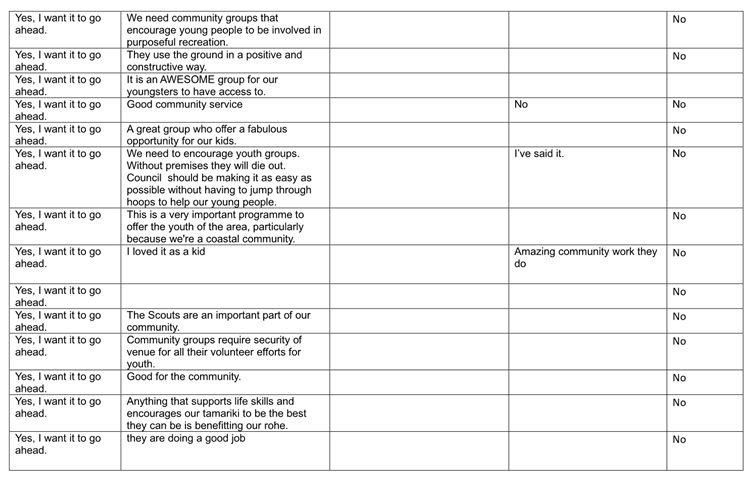

6.5 Appointment
for Rangitane Maritime Development Expert Consenting Panel
File
Number: A4606631
Author: Ellie
Greenwood, Democracy Advisor
Authoriser: Casey
Gannon, Manager - Democracy Services
Take Pūrongo / Purpose of the Report
To formalise an appointment on behalf of the Far North
District Council for the Rangitane Maritime Development Expert Consenting Panel
under the COVID-19 Recovery (Fast-track Consenting) Act 2020.
WhakarĀpopoto matua / Executive Summary
· The Far
North District Council received an invitation to nominate a member/s to the
Rangitane Maritime Development Expert Consenting Panel from the Environmental
Protection Agency.
· It is
preferable that any nominees are a section 39A Resource Management Act Making
Good Decisions Commissioner.
· Far
North District Council has five Councillors who have attended the Making
Good Decisions course.
· If
Council nominates more than one person, the panel convener may decide which one
of those nominees is to be appointed as a member.
· The
person nominated by a local authority may, but need not, be an elected member
of the local authority (clause 3(3) of Schedule 5 of the Act).
· If the
Council chooses not to nominate a person, the decision falls to the panel
convener who must appoint a person with the appropriate skills and experience.
|
tŪtohunga
/ Recommendation
That Council nominate XXXXXX to be considered as a
panel member on the Rangitane Maritime Development Expert Consenting Panel.
|
1) TĀhuhu kŌrero / Background
Central
Government introduced legislation to urgently promote employment to support New
Zealand’s recovery from the economic and social impacts of COVID-19, and
to support the certainty of ongoing investment across New Zealand, while
continuing to promote the sustainable management of natural and physical
resources. A panel is being convened to consider a resource consent for a
project including reclamation of the coastal marine area (CMA) to form land
that will accommodate an upgraded boat ramp, floating pontoon, carparking,
landscaping and public recreational amenities at Rangitane, Kerikeri.
The Far North
District Council has been invited to provide a short bio for any persons
wishing to be nominated, the panel convener will then consider the nominees and
select the most appropriately skilled and experienced person for the role.
The invitation
asked that the bio for each nominee include commentary on whether the nominee
was a Resource Management Act Making Good Decisions Commissioner and to note
their experience on hearings panels.
Any potential conflicts of interest and time commitments
relating to the project the nominee may have should also be identified. It is
anticipated that the time commitment for this project will be approximately 55
working days, unless the panel seeks an extension to their timeframes, in which
there could be an additional 25 working days commitment.
2) matapaki me NgĀ KŌwhiringa /
Discussion and Options
Far North District Council has five Councillors who have
attended the Making Good Decisions course. Councillors who have
completed and passed the Making Good Decisions course are Kōwhai
Kelly Stratford, Cr Ann Court and Cr Felicity Foy.
Cr Hilda Halkyard-Harawira has completed the course and is
expecting results. Cr Steve McNally has completed the course and has not yet
completed the assessment.
TAKE TŪTOHUNGA
/ REASON FOR THE RECOMMENDATION
The panel convener will ultimately decide who sits on the
Panel, but this recommendation narrows down the selection process for the panel
convener to determine who can best contribute given the skills and experience
wanted.
3) PĀnga PŪtea me ngĀ
wĀhanga tahua / Financial Implications and Budgetary Provision
There are no financial implications or need for budgetary
provisions.
Āpitihanga
/ Attachments
1. Letter
Seeking Panel Nominations from FNDC - A4606626 ⇩ 
Hōtaka Take Ōkawa / Compliance Schedule:
Full consideration has been given to the provisions of the
Local Government Act 2002 S77 in relation to decision making, in particular:
1. A
Local authority must, in the course of the decision-making process,
a) Seek
to identify all reasonably practicable options for the achievement of the
objective of a decision; and
b) Assess
the options in terms of their advantages and disadvantages; and
c) If
any of the options identified under paragraph (a) involves a significant
decision in relation to land or a body of water, take into account the
relationship of Māori and their culture and traditions with their
ancestral land, water sites, waahi tapu, valued flora and fauna and other
taonga.
2. This
section is subject to Section 79 - Compliance with procedures in relation to
decisions.
|
He
Take Ōkawa / Compliance Requirement
|
Aromatawai
Kaimahi / Staff Assessment
|
|
State the level of significance
(high or low) of the issue or proposal as determined by the Council’s
Significance and Engagement Policy
|
This is a matter of low
significance.
|
|
State the relevant Council
policies (external or internal), legislation, and/or community outcomes (as
stated in the LTP) that relate to this decision.
|
This process is governed by the
COVID-19 Recovery (Fast-track Consenting) Act 2020 and the Resource
Management Act 1991.
|
|
State whether this issue or
proposal has a District wide relevance and, if not, the ways in which the
appropriate Community Board’s views have been sought.
|
This process is not of district
relevance but requires skills and knowledge beyond those held by Community
Board members.
|
|
State the possible implications for Māori
and how Māori have been provided with an opportunity to contribute to
decision making if this decision is significant and relates to land and/or
any body of water.
State any Treaty of Waitangi Implications.
|
There are no implications for
Māori in nominating a person for the panel. The panel will however need
to consider implications for Māori as part of their process.
|
|
Identify persons likely to be
affected by or have an interest in the matter, and how you have given
consideration to their views or preferences (for example – youth, the
aged and those with disabilities).
|
Those nominated have agreed on
this approach.
|
|
State the financial implications
and where budgetary provisions have been made to support this decision.
|
There are no financial
implications or need for budgetary provision.
|
|
Chief Financial Officer review.
|
The Chief Financial Officer has
not reviewed this report.
|
|
Ordinary Council Meeting Agenda
|
14 March 2024
|


6.6 Committee
Recommendations and Resolutions - February 2024
File
Number: A4590953
Author: Ellie
Greenwood, Democracy Advisor
Authoriser: Casey
Gannon, Manager - Democracy Services
TAKE PŪRONGO / Purpose of the Report
· To
increase governance oversight of Committee business/discussions.
· Communicate
resolutions of Committee meetings.
· Escalate
Committee recommendations to Council.
WHAKARĀPOPOTO MATUA / Executive SummarY
· The
following Committee meetings have been held since the last ordinary Council
meeting.
o 20 February 2024 – Te
Koukou – Transport Committee
o 22 February 2024 – Te
Kuaka – Te Ao Māori Committee
o 28 February 2024 – Te
Miromiro – Assurance Risk and Finance Committee
· Copies
of the Committee meeting minutes are attached for information.
· Links to
the agendas containing the reports that formed the basis of the recommendations
below are included in this report.
|
TŪTOHUNGA
/ Recommendation
That Council
Te Kuaka- Te Ao Māori Committee: Item 6.6
– Te Kuaka Te Ao Māori Committee Open Resolutions Update February
2024
a) direct
CEO to include the consultation item for the implementation of Local
Government (Rating of Whenua Māori) Amendment Act 2021 to address rating
debt as part of this Long-Term Plan consultation document.
|
tĀHUHU KŌRERO / Background
This is a regular report to provide greater governance
oversight of discussions that occur at Committee meetings and to avoid
duplication of reading for Councillors for decisions that are recommended to
them, from each Committee meeting.
Copies of Committee meeting minutes that have occurred since
the last ordinary Council meeting are attached for information.
From time to time, Committee’s discuss items that are
outside their delegations. This report, when necessary, will highlight
recommendations from each Committee to Council for decision.
Information about Council, Committee or Community Board
meetings is publicly available at https://infocouncil.fndc.govt.nz/
MATAPAKI ME NGĀ KŌWHIRINGA /
Discussion and Next Steps
Since the last Council
meeting the following Committee meetings have occurred:
|
20 February
2024 – Te Koukou Transport Committee
20 February 2024 Te Koukou Agenda
Escalation required as part
of the Public Excluded Agenda
|
|
22 February 2024 – Te Kuaka Te Ao Māori Committee
22 February 2024 Te Kuaka Agenda
That
Council
Te
Kuaka- Te Ao Māori Committee: Item 6.6 – Te Kuaka Te Ao Māori
Committee Open Resolutions Update February 2024
a) direct CEO to
include the consultation item for the implementation of Local Government
(Rating of Whenua Māori) Amendment Act 2021 to address rating debt as
part of this Long-Term Plan consultation document.
|
|
28 February 2024 – Te
Miromiro Assurance Risk and Finance Committee
28
February 2024 Te Miromiro Agenda
No escalation required.
|
PĀNGA PŪTEA ME NGĀ WĀHANGA
TAHUA / Financial Implications and Budgetary Provision
This report does not
intend to repeat the financial implications, options or decision-making
requirements for the recommendations listed. Please review the agendas via the
provided links for further information.
Āpitihanga
/ Attachments
1. 2024-02-20
Te Koukou - Transport Committee Minutes - A4577928 ⇩ 
2. 2024-02-22
Te Kuaka Te Ao Māori Committee Minutes - A4581651 ⇩ 
3. 2024-02-28
Te Miromiro - Assurance, Risk and Finance Committee Minutes - A4592258 ⇩ 
|
Ordinary
Council Meeting Agenda
|
14 March 2024
|




|
Ordinary Council
Meeting Agenda
|
14 March 2024
|




|
Ordinary Council
Meeting Agenda
|
14 March 2024
|





7 Ngā
Pūrongo Taipitopito / Information Reports
7.1 Community
Board Minutes - February 2024
File
Number: A4578218
Author: Ellie
Greenwood, Democracy Advisor
Authoriser: Casey
Gannon, Manager - Democracy Services
TAKE PŪRONGO / Purpose of the Report
To provide an overview of
resolutions made by Community Boards with an opportunity for Chairpersons to
speak with Council about pertinent discussions held at Community Board.
WHAKARĀPOPOTO MATUA / Executive SummarY
Minutes from Te
Hiku, Kaikohe-Hokianga, and Bay of Islands-Whangaroa Community Board February
2024 meetings are attached for Council information.
|
TŪTOHUNGA
/ Recommendation
That Council note the following Community Board
minutes:
· 13 February 2024 Te Hiku Community Board;
· 19 February 2024 Extraordinary Te Hiku Community Board;
· 15 February 2024 Bay of Islands-Whangaroa Community Board; and
· 16 February 2024 Kaikohe-Hokianga Community Board.
|
tĀHUHU KŌRERO / Background
This report is to provide
Council with an overview of resolutions made at Community Board meetings and
for Community Board Chairpersons to raise any Community Board issues with
Council.
MATAPAKI ME NGĀ KŌWHIRINGA /
Discussion and Next Steps
This is intended as an information report but shows on the
agenda as a standard report to place it earlier on the agenda.
From time-to-time Community Boards may make recommendations
to Council. This report is not considered to be the appropriate mechanism for
Council to make a decision from a Community Board recommendation. Council could
however move a motion to formally request a report on a particular matter for
formal consideration at a subsequent meeting. The report would then ensure that
Council have sufficient information to satisfy the decision-making requirements
under the Local Government Act 2002 (sections 77-79).
The minutes presented to this meeting include
recommendations to Council, which staff have requested be considered by Council
for the June meeting.
PĀNGA PŪTEA ME NGĀ WĀHANGA
TAHUA / Financial Implications and Budgetary Provision
There are no financial
implications or need for budget provision in considering this report.
Āpitihanga
/ Attachments
1. 2024-02-13
Te Hiku Community Board Minutes - A4570819 ⇩ 
2. 2024-02-19
Te Hiku Community Board Minutes - A4577788 ⇩ 
3. 2024-02-15
Bay of Islands-Whangaroa Community Board Minutes - A4574253 ⇩ 
4. 2024-02-16
Kaikohe-Hokianga Community Board Minutes - A4570136 ⇩ 
|
Ordinary Council Meeting Agenda
|
14 March 2024
|







|
Ordinary Council
Meeting Agenda
|
14 March 2024
|


|
Ordinary Council
Meeting Agenda
|
14 March 2024
|





|
Ordinary Council
Meeting Agenda
|
14 March 2024
|






7.2 Council
Open Resolutions Update March 2024
File
Number: A4578222
Author: Ellie
Greenwood, Democracy Advisor
Authoriser: Casey
Gannon, Manager - Democracy Services
Take Pūrongo / Purpose of the Report
To provide Council with
an overview of outstanding Council and the previous term Committee decisions
from 1 January 2021.
WhakarĀpopoto matua / Executive Summary
· Open resolutions are a mechanism to communicate progress against
decisions/resolutions.
· Open resolutions are also in place for all formal elected member
meetings.
|
tŪtohunga
/ Recommendation
That Council receive the report Council Open
Resolution Update March 2024.
|
1) TĀhuhu kŌrero / Background
Any resolution or decision from a meeting is compiled on an
open resolution status report, to capture actions trigged by Council decisions.
Staff provide updates on progress against tasks that are not yet completed.
The open resolution report also includes outstanding actions
from previous triennium committees.
2) matapaki me NgĀ KŌwhiringa /
Discussion and Options
The outstanding tasks are often multi-facet projects that
take longer to fully complete. Where a decision differs to the recommendation
of staff there may be unintended consequences or challenges that take longer
for staff to work through.
TAKE TŪTOHUNGA
/ REASON FOR THE RECOMMENDATION.
To provide Council with
an overview of outstanding Council decisions from 1 January 2020.
3) PĀnga PŪtea me ngĀ
wĀhanga tahua / Financial Implications and Budgetary Provision
There are no financial
implications or need for budgetary provision in receiving this report.
Āpitihanga
/ Attachments
1. Open
Resolution Report - A4607054 ⇩ 
|
Ordinary
Council Meeting Agenda
|
14 March 2024
|
















7.3 Mayor
and Councillor's Reports
File
Number: A4592501
Author: Ellie
Greenwood, Democracy Advisor
Authoriser: Casey
Gannon, Manager - Democracy Services
TE TAKE PŪRONGO / Purpose of the Report
This report is a mechanism to have open communication and
transparency on activities undertaken by Councillors as elected
representatives.
|
NGĀ
TŪTOHUNGA / Recommendation
That Council note the reports submitted by Kahika Mayor
Moko Tepania, Kōwhai Kelly Stratford, Crs Hilda Halkyard- Harawira and
Ann Court.
|
TE tĀHUHU KŌRERO / Background
Kahika-Mayor Tepania has
reintroduced Council members reports as a mechanism to have open communication
and transparency on activities undertaken by Councillors as elected
representatives. Members reports are compulsory for Councillors.
TE MATAPAKI ME NGĀ KŌWHIRINGA /
Discussion and Next Steps
Members reports are attached for
information.
REASON
FOR THE RECOMMENDATION
To formally receive the Mayor and
Councillor reports.
NGĀ PĀNGA PŪTEA ME NGĀ WĀHANGA
TAHUA / Financial Implications and Budgetary Provision
There are no financial implications
or the need for budgetary provision as a result of this report.
ngĀ
Āpitihanga / Attachments
1. Kahika
Report Mayor Moko Tepania - A4605535 ⇩ 
2. Kōwhai
Report Kelly Stratford - A4606033 ⇩ 
3. Member
Report Hilda Halkyard-Harawira - A4592450 ⇩ 
4. Member
Report Ann Court - A4601634 ⇩ 
|
Ordinary
Council Meeting Agenda
|
14 March 2024
|





|
Ordinary Council
Meeting Agenda
|
14 March 2024
|


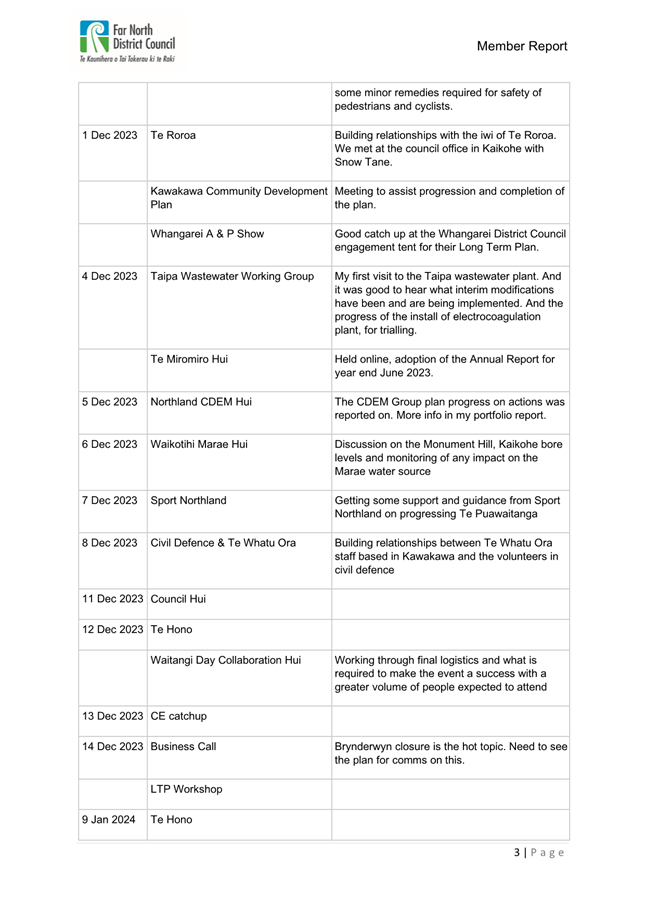
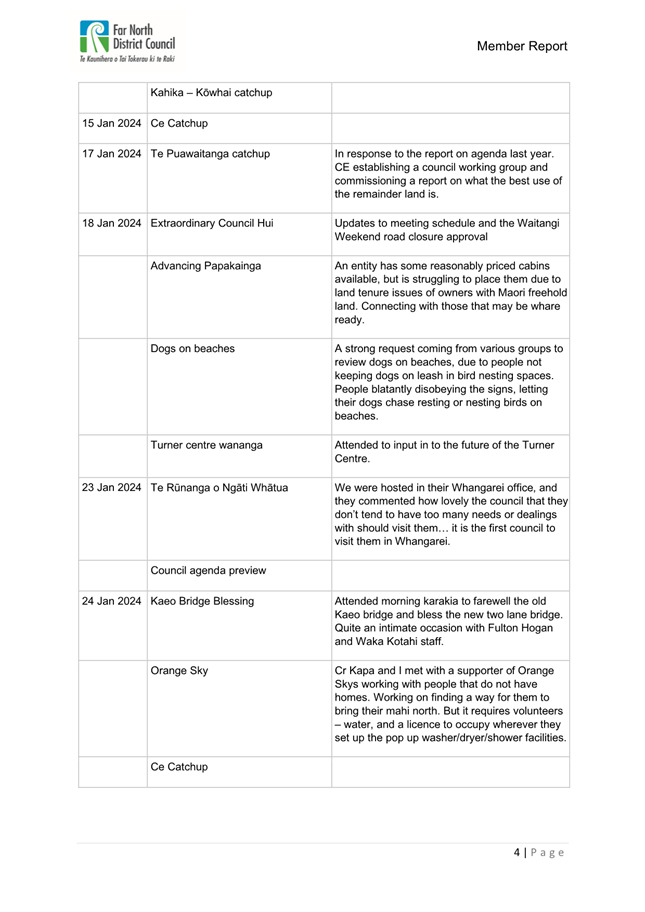
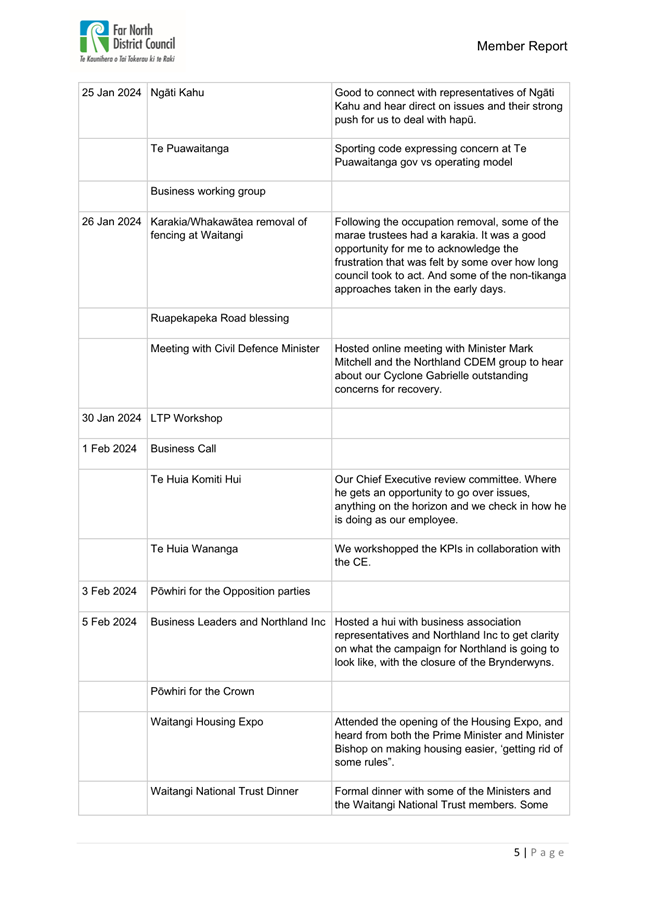

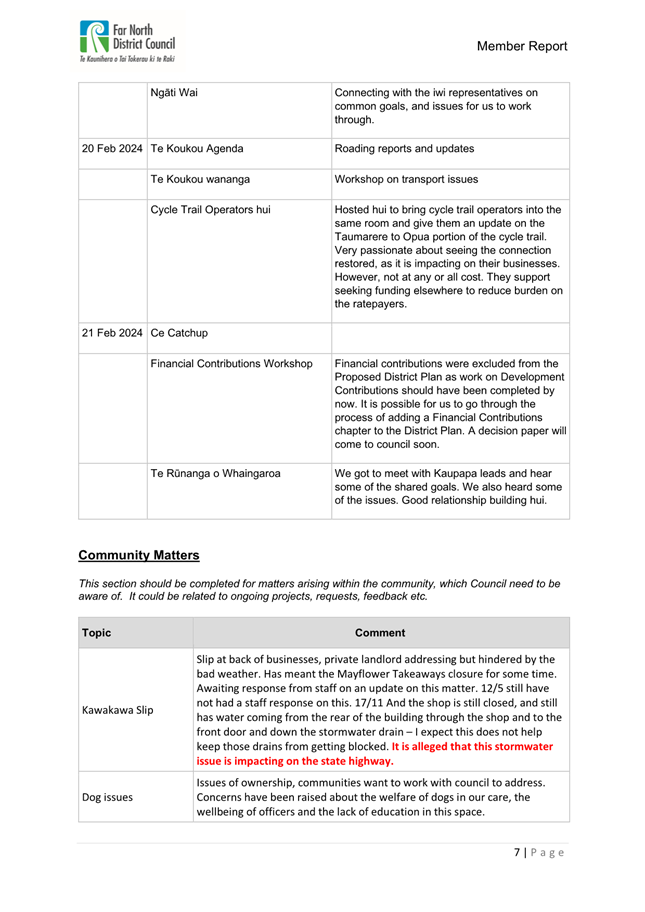
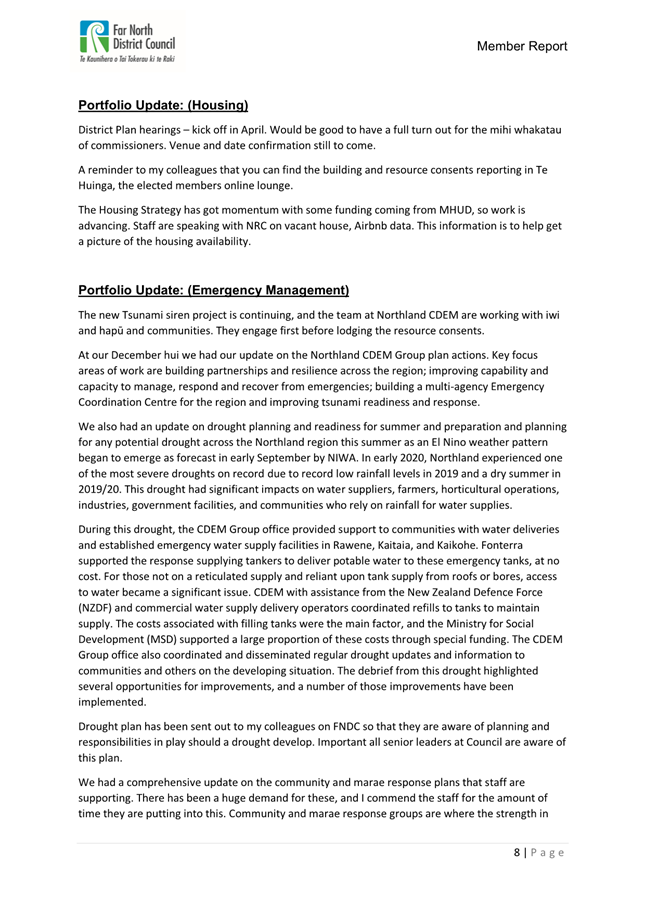
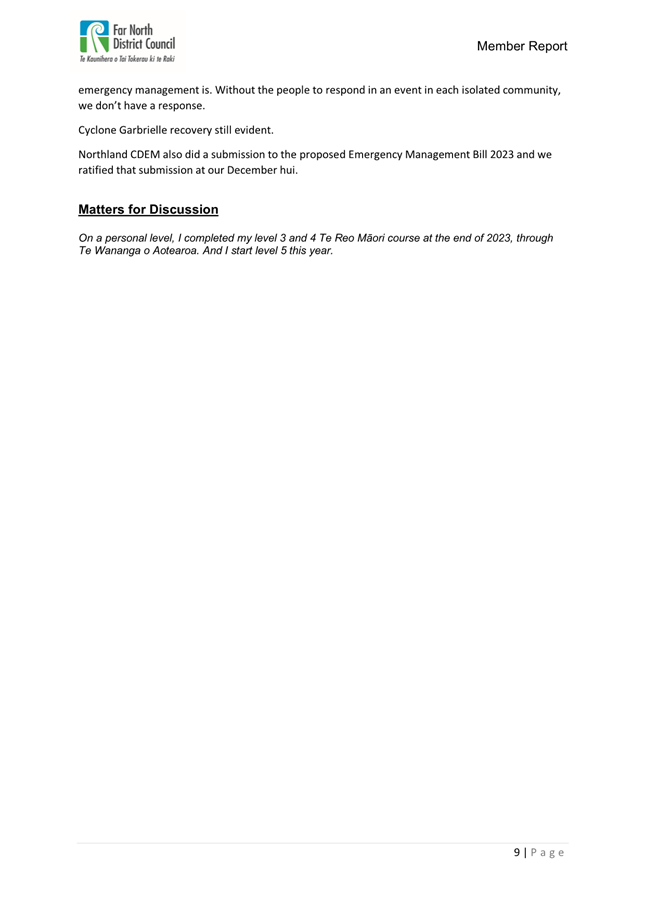
|
Ordinary Council
Meeting Agenda
|
14 March 2024
|
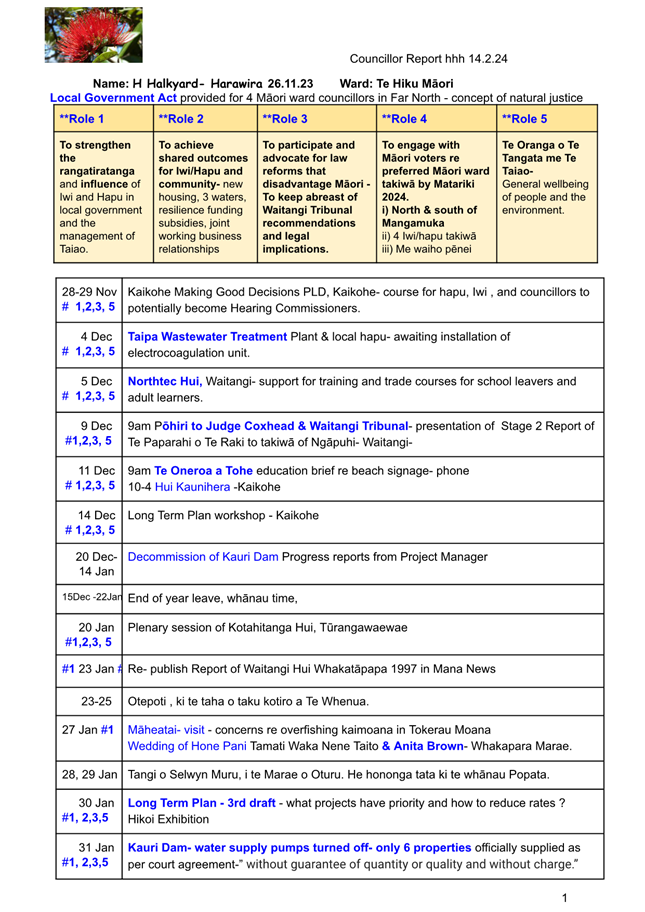
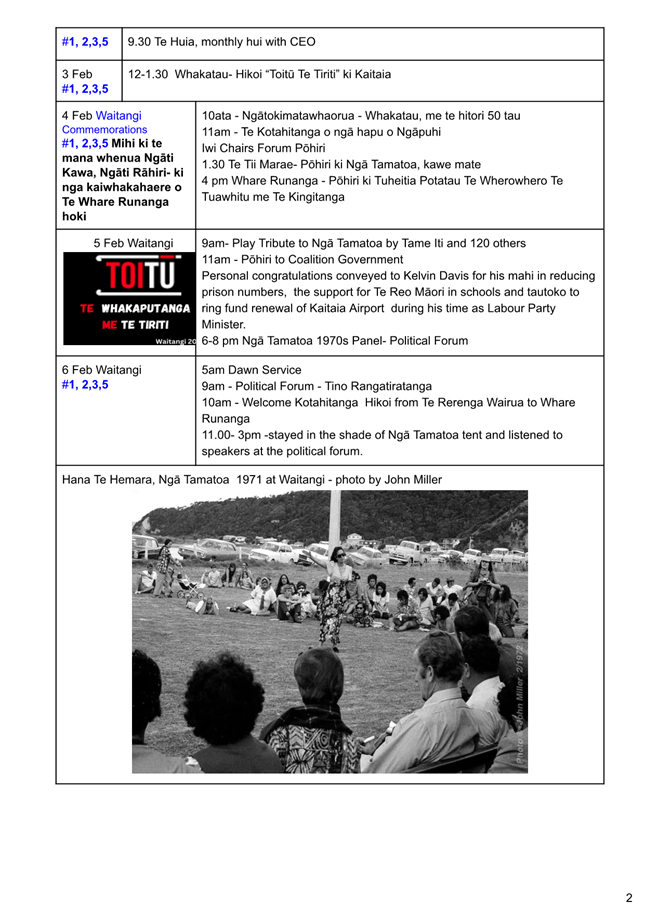
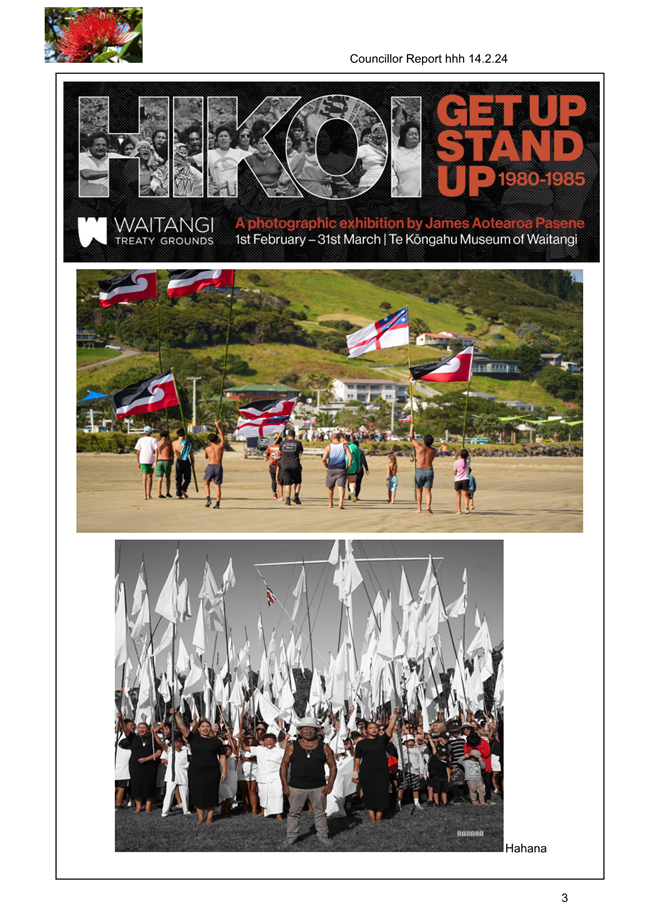
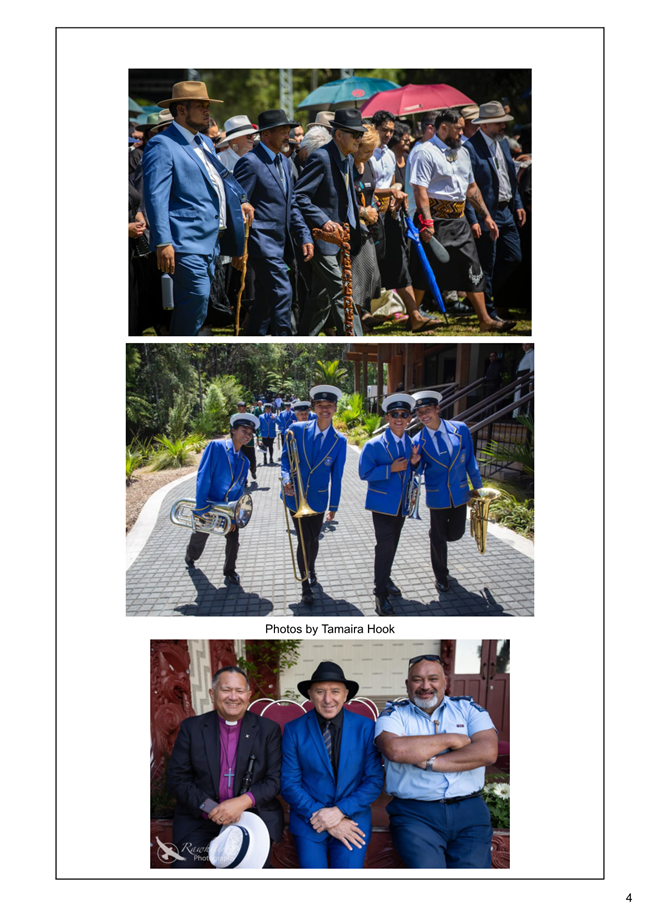
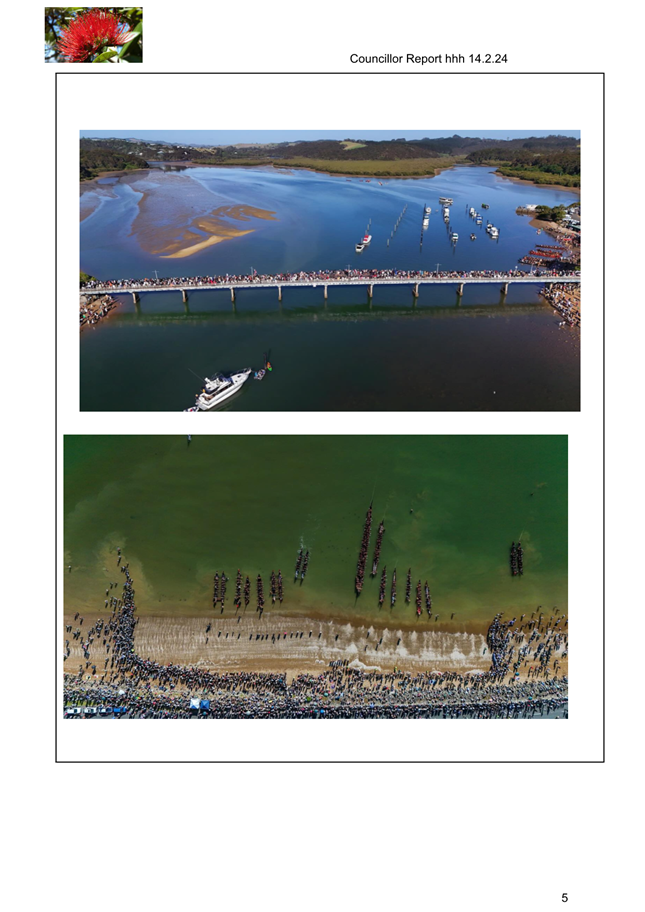
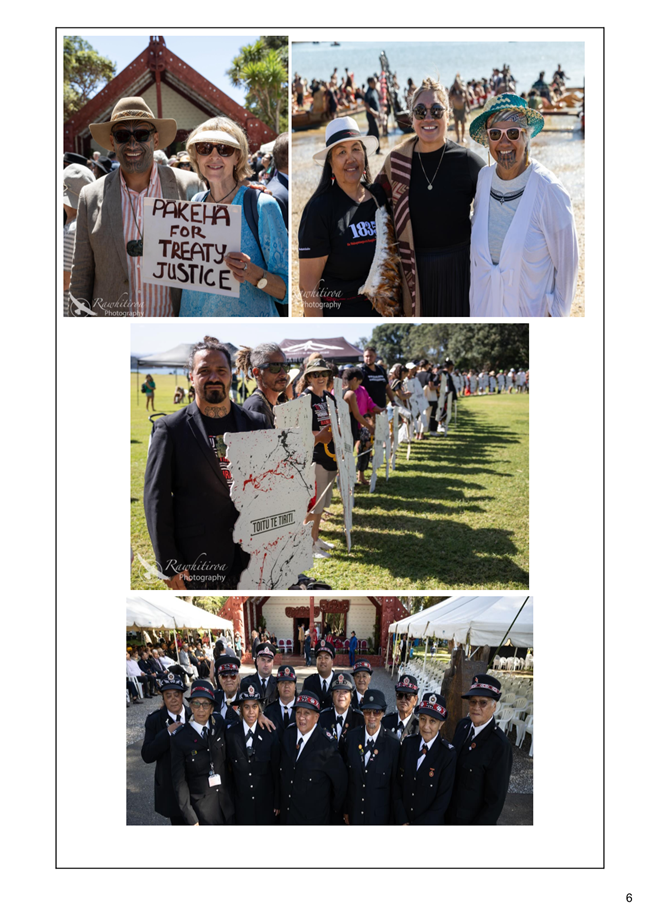

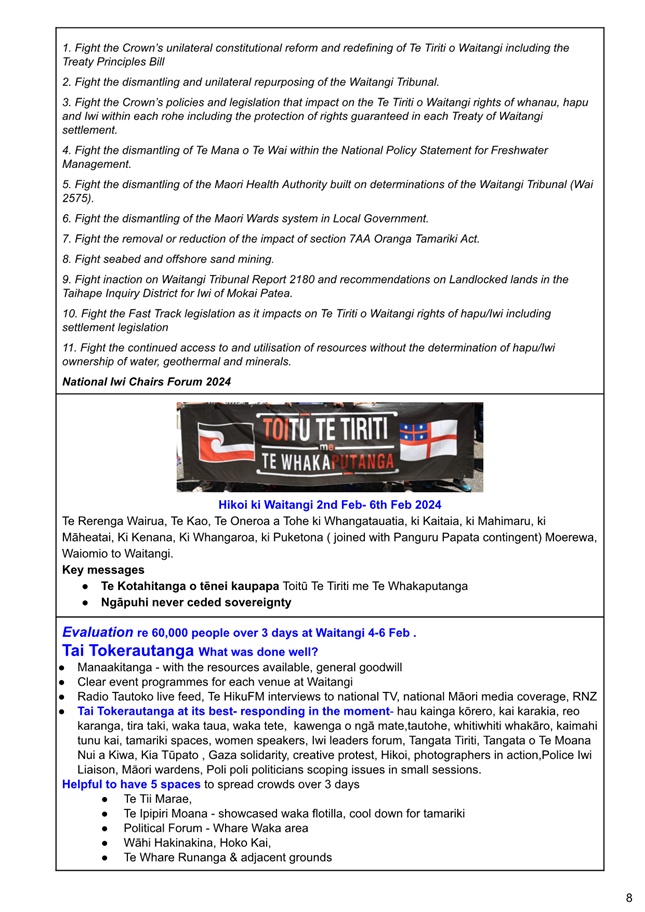
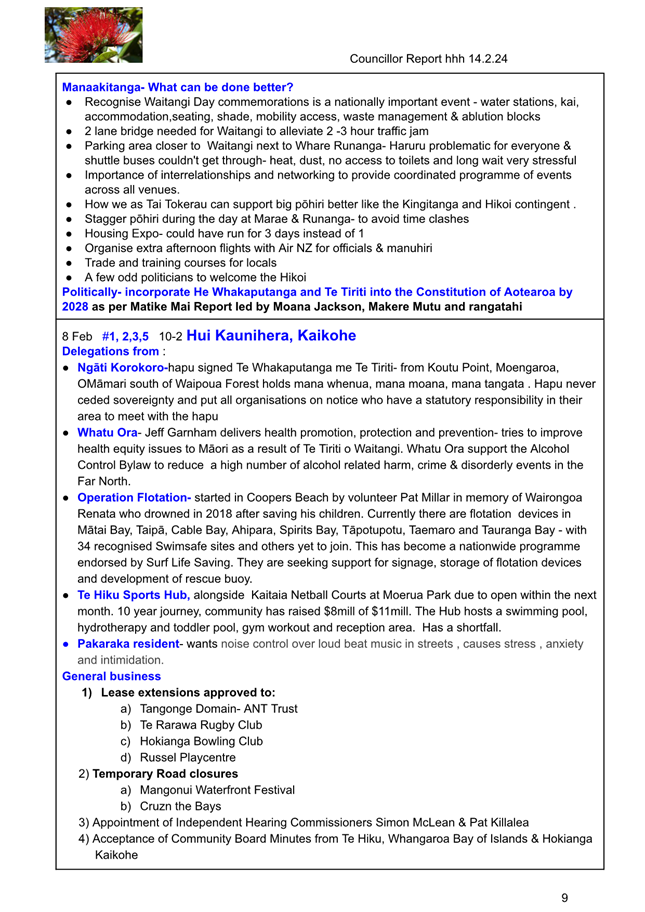
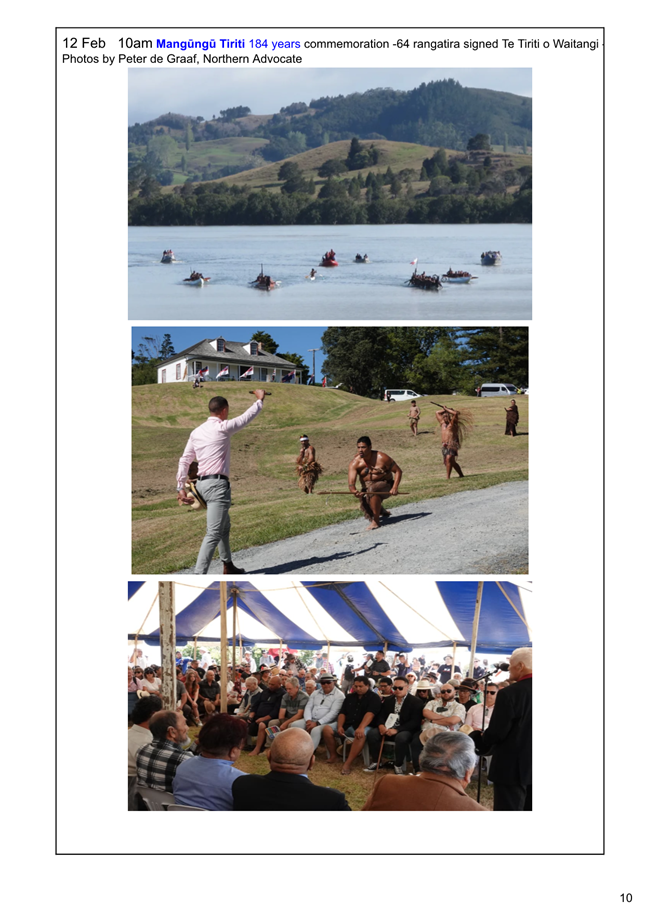
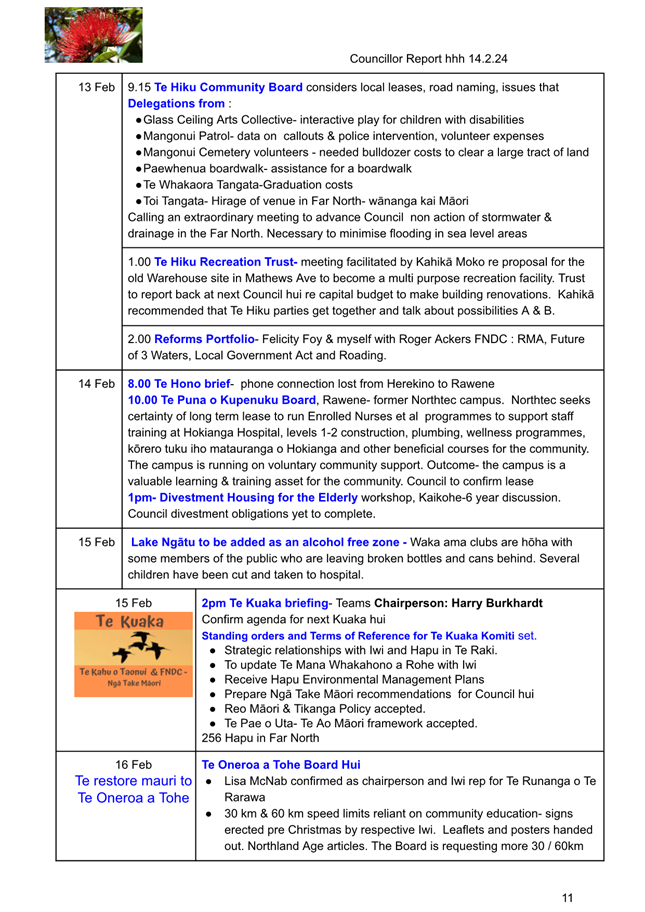
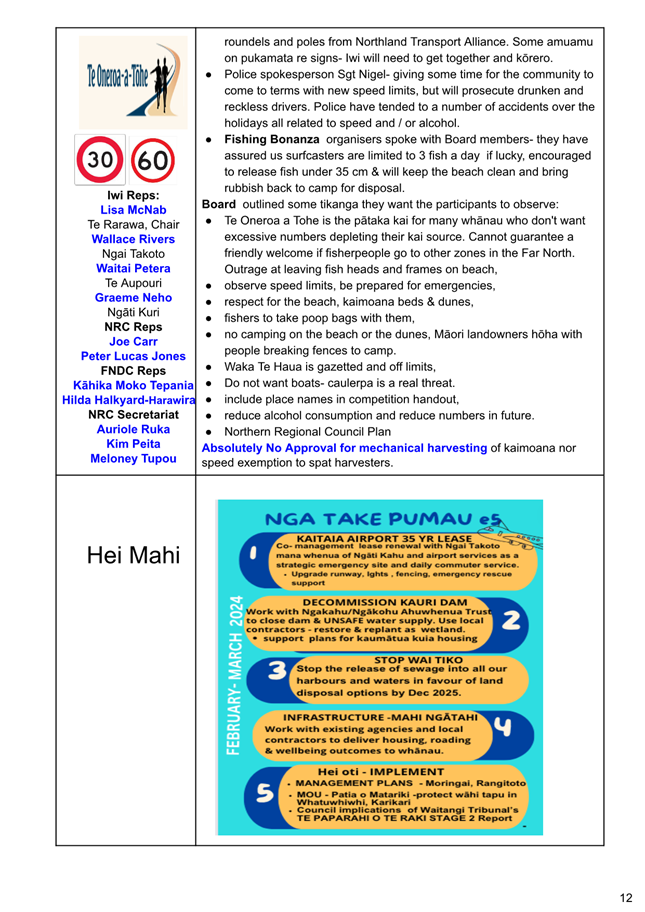
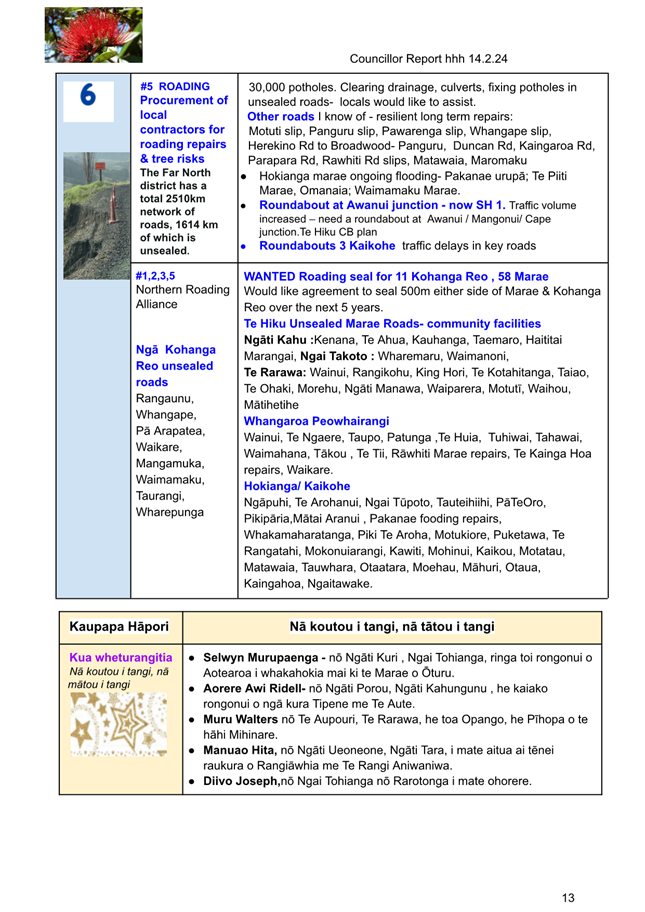
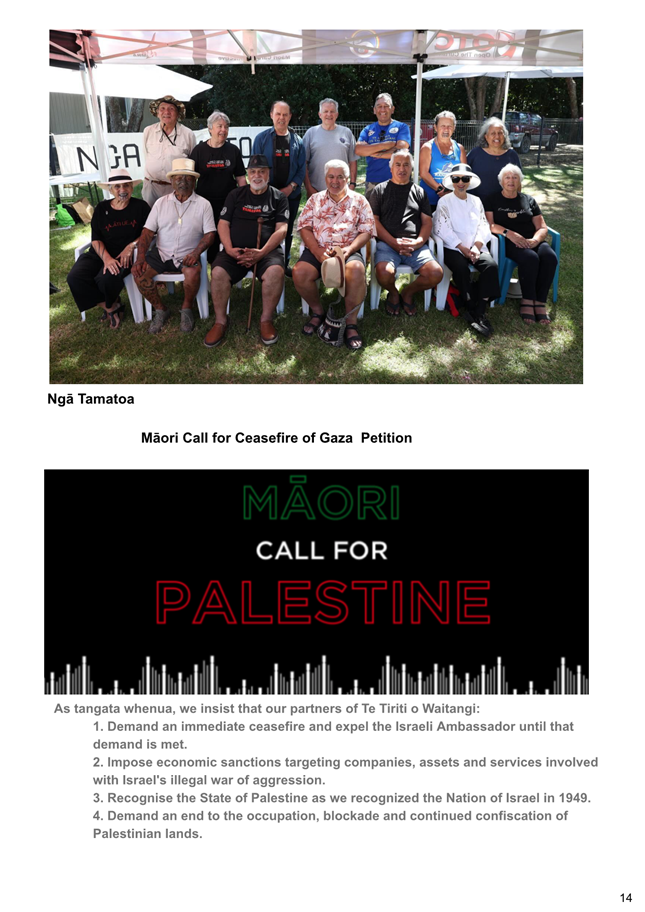
|
Ordinary Council
Meeting Agenda
|
14 March 2024
|
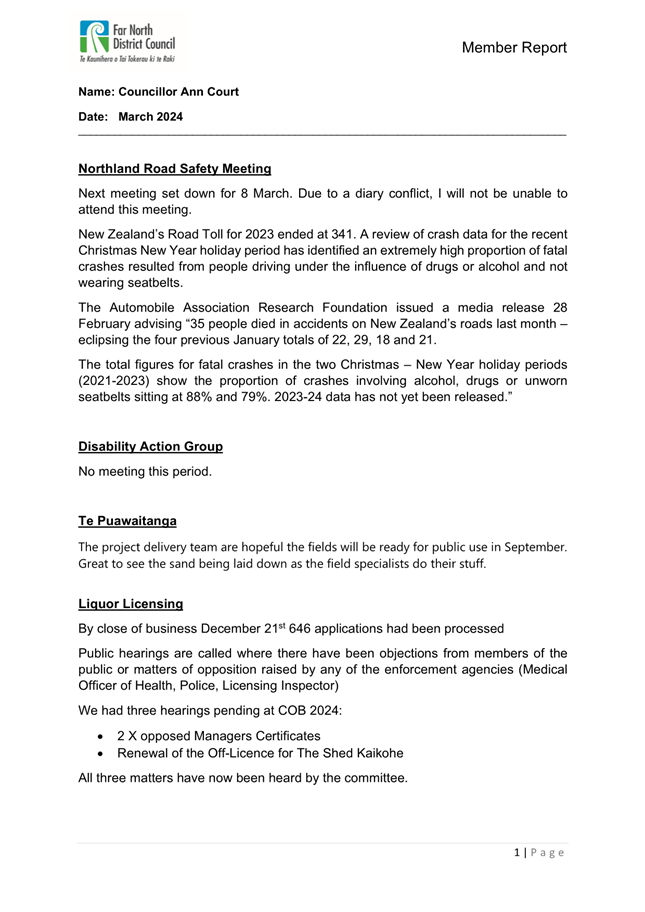
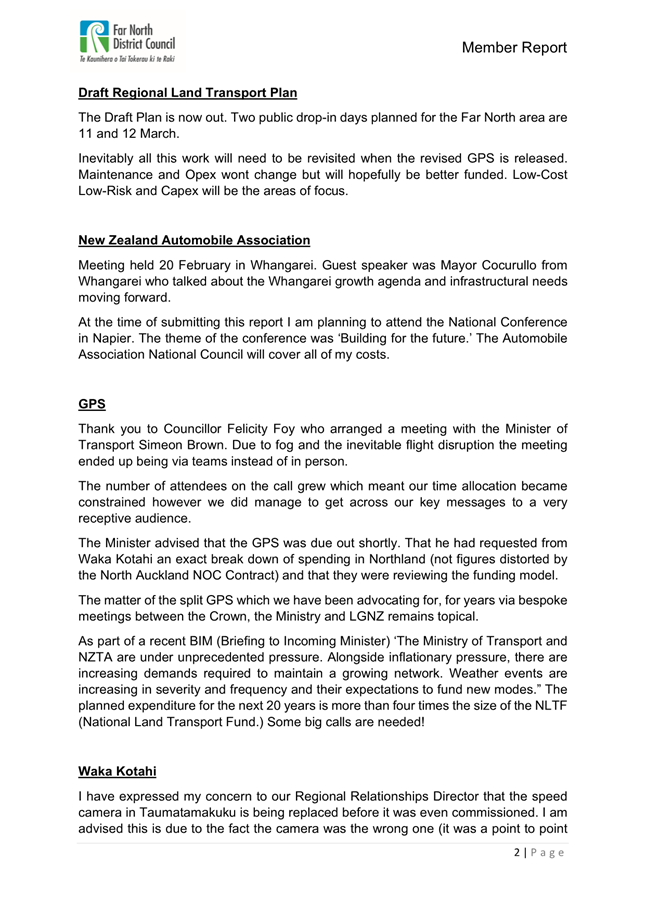
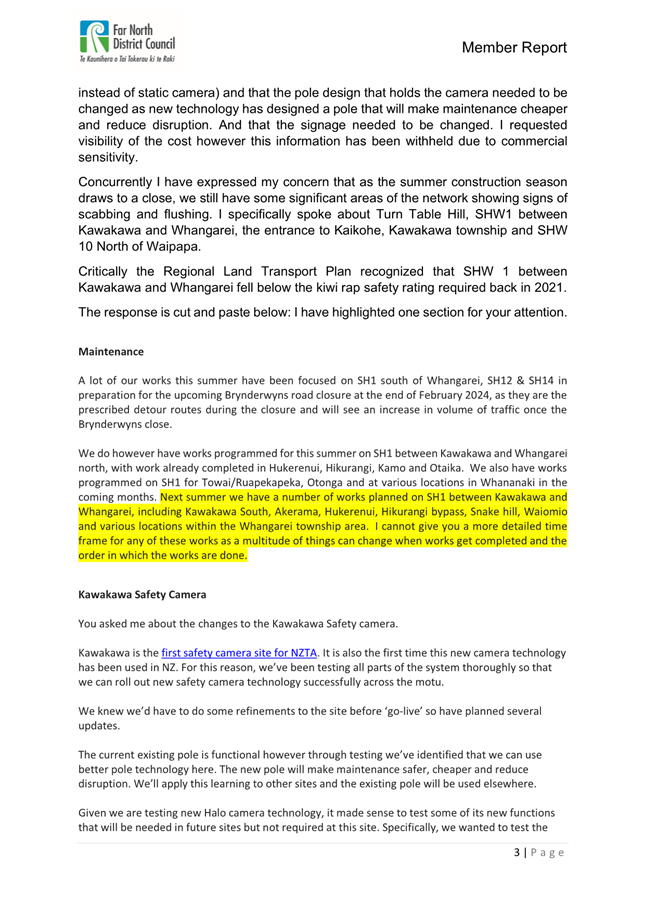
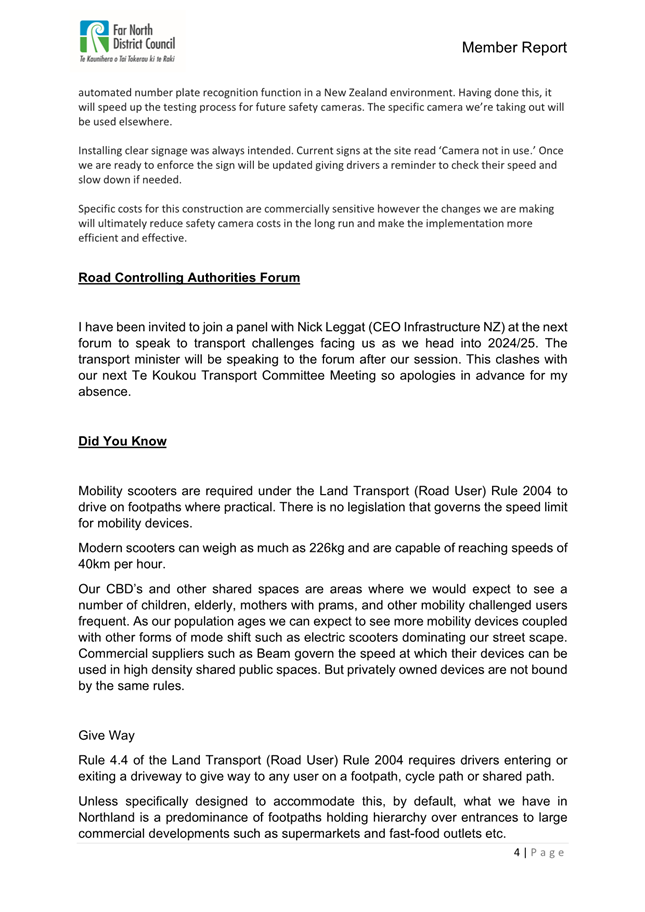
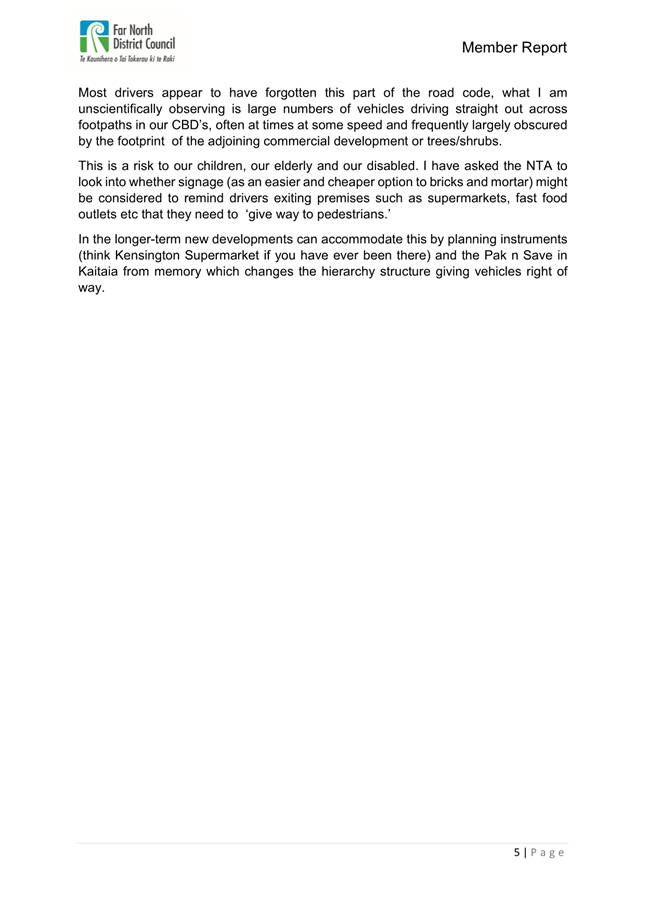
8 Te
Wāhanga Tūmataiti / Public Excluded
RESOLUTION TO
EXCLUDE THE PUBLIC
|
Recommendation
That the public be excluded from the following parts of
the proceedings of this meeting.
The general subject matter of each matter to be considered
while the public is excluded, the reason for passing this resolution in
relation to each matter, and the specific grounds under section 48 of the
Local Government Official Information and Meetings Act 1987 for the passing
of this resolution are as follows:
|
General subject of each matter to be
considered
|
Reason for passing this resolution in
relation to each matter
|
Ground(s) under section 48 for the
passing of this resolution
|
|
8.1 - Confirmation of Previous Minutes
- Public Excluded
|
s7(2)(a) - the withholding of the information is
necessary to protect the privacy of natural persons, including that of
deceased natural persons
s7(2)(f)(i) - free and frank expression of
opinions by or between or to members or officers or employees of any local
authority
s7(2)(h) - the withholding of the information is
necessary to enable Council to carry out, without prejudice or
disadvantage, commercial activities
s7(2)(i) - the withholding of the information is
necessary to enable Council to carry on, without prejudice or disadvantage,
negotiations (including commercial and industrial negotiations)
|
s48(1)(a)(i) - the public conduct of the relevant
part of the proceedings of the meeting would be likely to result in the
disclosure of information for which good reason for withholding would exist
under section 6 or section 7
|
|
8.2 - 11 Matthews Ave, Kaitaia
|
s7(2)(h) - the withholding of the information is
necessary to enable Council to carry out, without prejudice or
disadvantage, commercial activities
s7(2)(i) - the withholding of the information is
necessary to enable Council to carry on, without prejudice or disadvantage,
negotiations (including commercial and industrial negotiations)
|
s48(1)(a)(i) - the public conduct of the relevant
part of the proceedings of the meeting would be likely to result in the
disclosure of information for which good reason for withholding would exist
under section 6 or section 7
|
|
8.3 - Solid Waste Services Contract
Award
|
s7(2)(b)(ii) - the withholding of the information
is necessary to protect information where the making available of the information
would be likely unreasonably to prejudice the commercial position of the
person who supplied or who is the subject of the information
|
s48(1)(a)(i) - the public conduct of the relevant
part of the proceedings of the meeting would be likely to result in the
disclosure of information for which good reason for withholding would exist
under section 6 or section 7
|
|
8.4 - Community Facilities Operations
and Maintenance Contract Award
|
s7(2)(b)(ii) - the withholding of the information
is necessary to protect information where the making available of the
information would be likely unreasonably to prejudice the commercial
position of the person who supplied or who is the subject of the
information
|
s48(1)(a)(i) - the public conduct of the relevant
part of the proceedings of the meeting would be likely to result in the
disclosure of information for which good reason for withholding would exist
under section 6 or section 7
|
|
8.5 - John Butler Centre Far North
District Council Lease Renewal
|
s7(2)(h) - the withholding of the information is
necessary to enable Council to carry out, without prejudice or disadvantage,
commercial activities
s7(2)(i) - the withholding of the information is
necessary to enable Council to carry on, without prejudice or disadvantage,
negotiations (including commercial and industrial negotiations)
|
s48(1)(a)(i) - the public conduct of the relevant
part of the proceedings of the meeting would be likely to result in the
disclosure of information for which good reason for withholding would exist
under section 6 or section 7
|
|
8.6 - Committee Recommendations and
Resolutions - February 2024
|
s7(2)(a) - the withholding of the information is
necessary to protect the privacy of natural persons, including that of
deceased natural persons
s7(2)(f)(i) - free and frank expression of
opinions by or between or to members or officers or employees of any local
authority
s7(2)(h) - the withholding of the information is
necessary to enable Council to carry out, without prejudice or
disadvantage, commercial activities
|
s48(1)(a)(i) - the public conduct of the relevant
part of the proceedings of the meeting would be likely to result in the
disclosure of information for which good reason for withholding would exist
under section 6 or section 7
|
|
8.7 – Te Huia Executive Review
Committee – General Employment Matters
|
s7(2)(f)(i) - free and frank expression of
opinions by or between or to members or officers or employees of any local
authority
|
s48(1)(a)(i) - the public conduct of the relevant
part of the proceedings of the meeting would be likely to result in the
disclosure of information for which good reason for withholding would exist
under section 6 or section 7
|
|






















































































































































